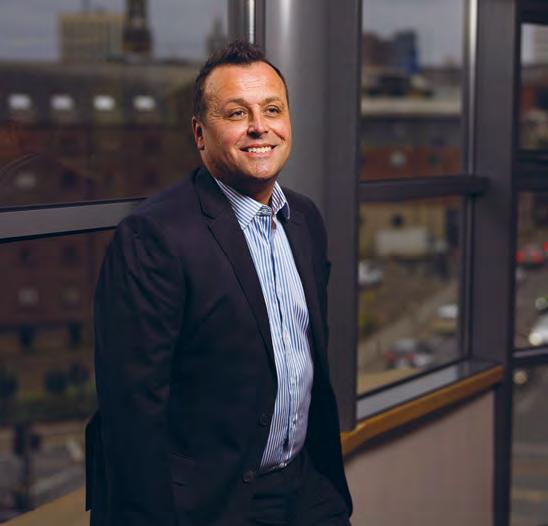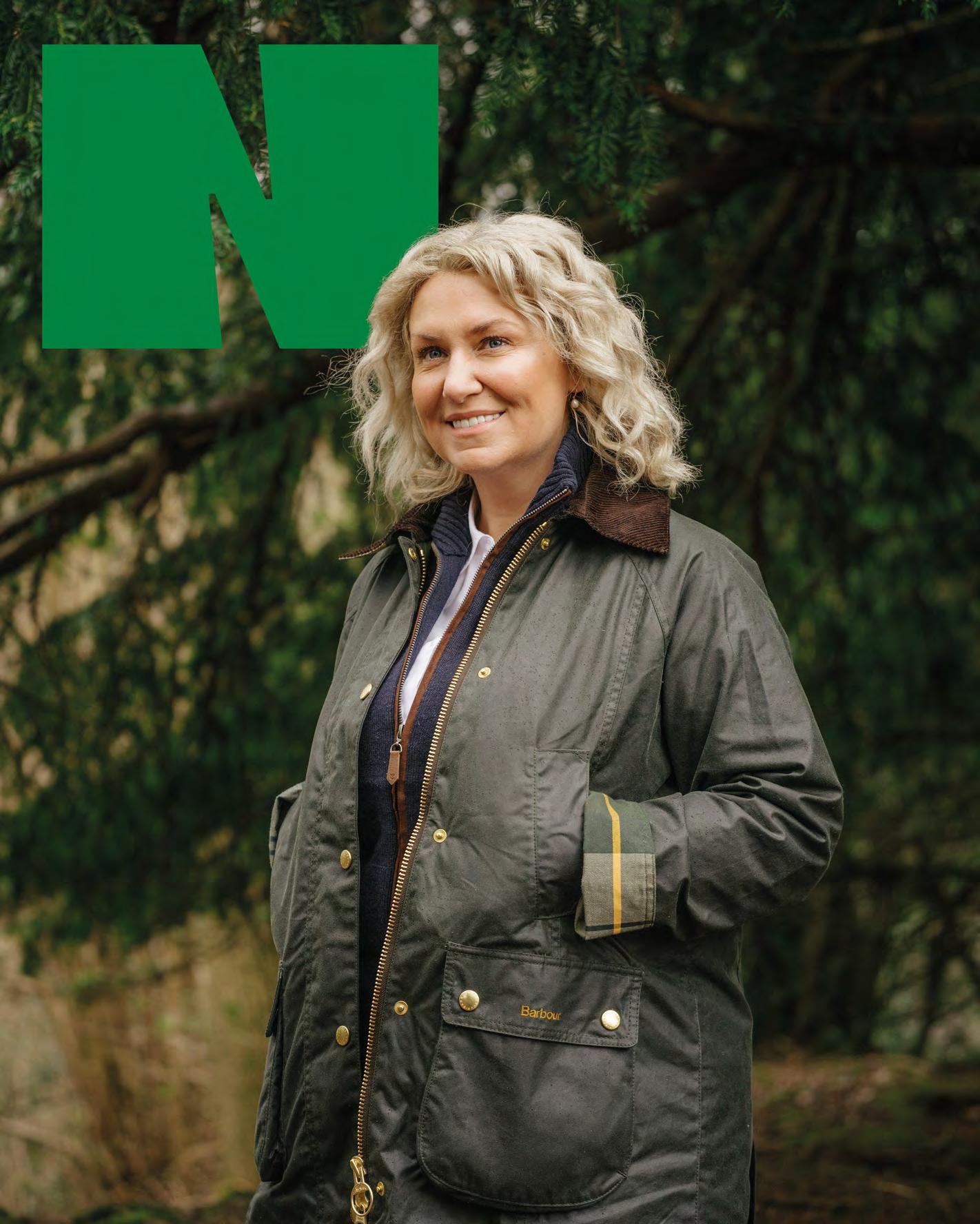
HANNAH ATKINSON


HANNAH ATKINSON
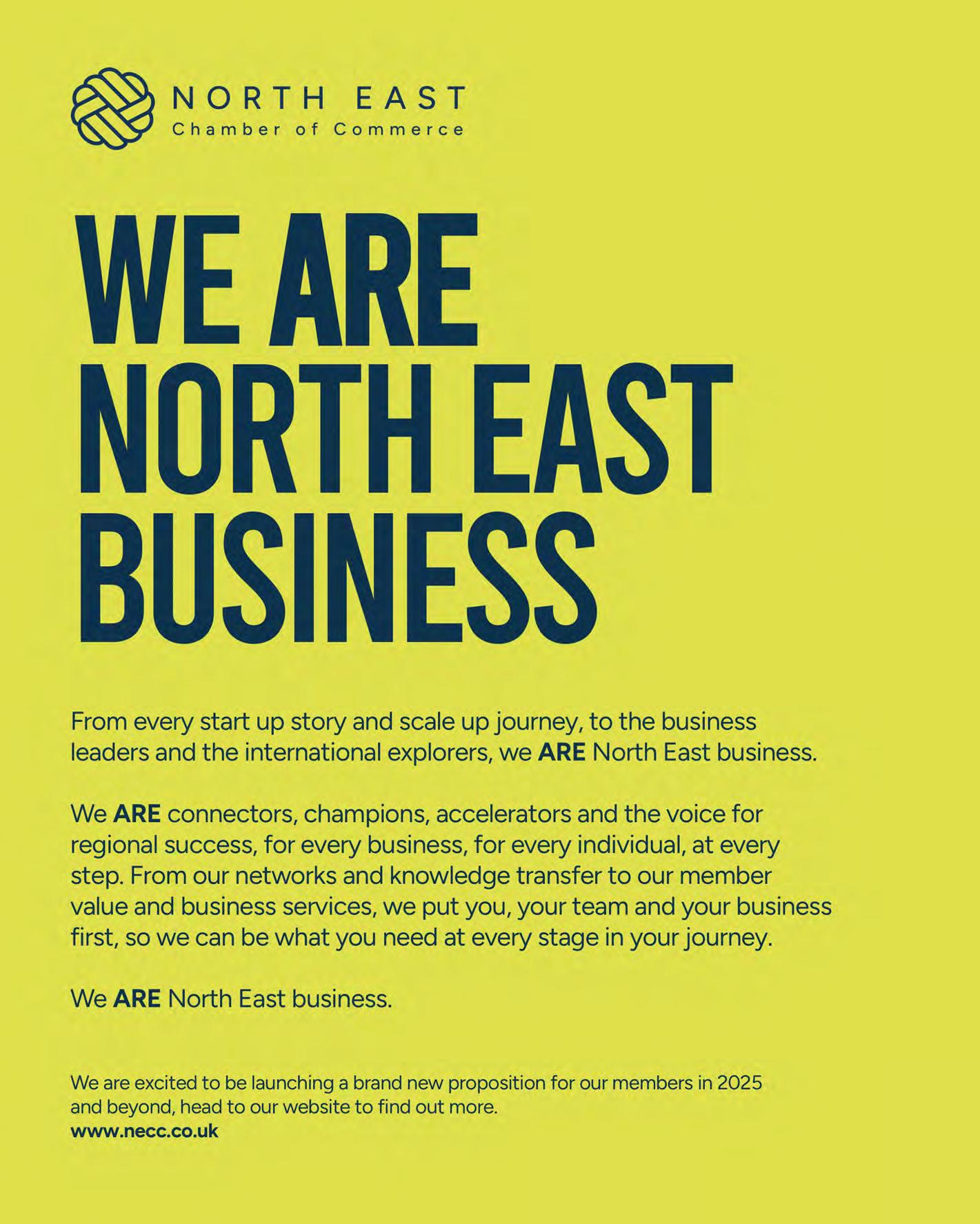





As Chancellor Rachel Reeves prepares to deliver the UK’s Spring Forecast in late March, the focus intensifies on the country’s economic wellbeing.

Building a more balanced workplace
With International Women’s Day returning in early March, the occasion once again highlights the vital importance of gender equality in the workplace.
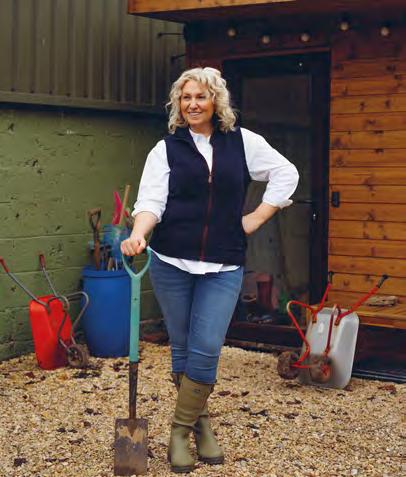

5 minutes with Zara Paul is co-founder of Durham web-based artificial intelligence video editing platform Choppity. Here, they tell Steven Hugill about the venture’s founding, the dynamics of running a business alongside their partner and how a recent appearance on Dragons’ Den has provided great confidence for future endeavours.
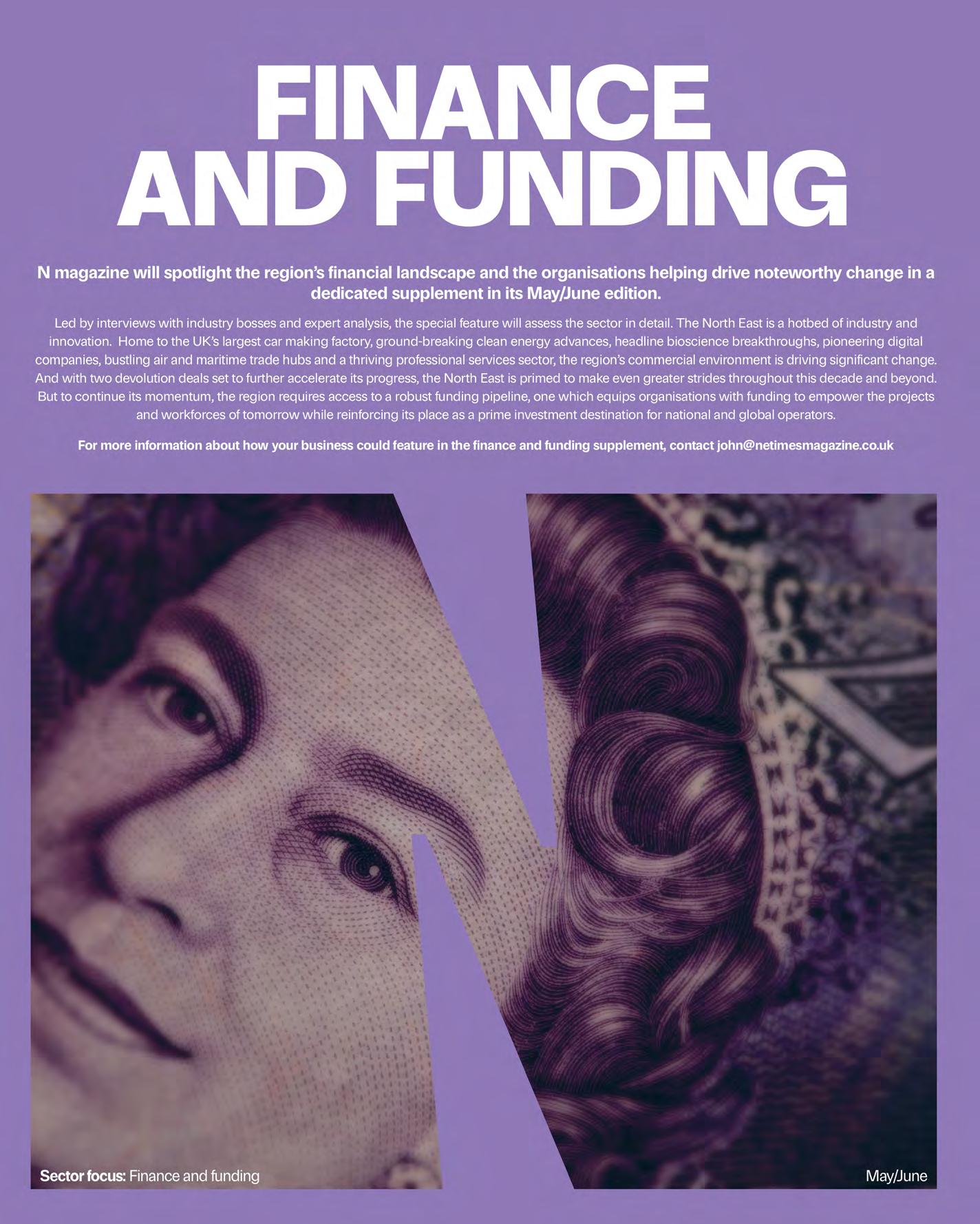
HEAD OFFICE
The Stamp Exchange, 7 Westgate Road, Newcastle, NE1 1SA
All rights reserved. Reproduction, in whole or in part without written permission, is strictly prohibited.
CIRCULATION:
To confirm our circulation, please contact Chris Westwood, of Buxton Press, via chriswestwood@buxtonpress.com
To amend your mailing address or remove yourself from our mailing list contact hello@netimesmagazine.co.uk
CONTACT:
@NETimesmagazine www.netimesmagazine.co.uk
PHOTOGRAPHY:
All photos taken by N staff are copyright North East Times Magazine Ltd, and are taken solely for use in N or products published by North East Times Magazine Ltd.
If you wish to use or publish a photograph taken for N, please contact pete@netimesmagazine.co.uk
Editor Steven Hugill steven@netimesmagazine.co.uk
Business journalist
Colin Young T: 07808 974 533 colin@netimesmagazine.co.uk
Business development director
John Duns T: 07920 152 523 john@netimesmagazine.co.uk
Creative & managing director
Peter Mallon T: 07590 064 800 pete@netimesmagazine.co.uk
Partnership & marketing manager Sarah Law sarah@netimesmagazine.co.uk
STRATEGIC PARTNERS


ADVERTISING CHARGES:
There is a £25 charge for every set of amendments, following the first initial set of amendments, which is free of charge for adverts designed by North East Times Magazine Ltd.
CANCELLATIONS:
If an advert is cancelled by the booker within a seven day period prior to our print deadline, the advert will be charged in full, plus VAT.
EDITORIAL:
Editorial must be received by the 9th of the month or no responsibility is accepted for errors. The opinions expressed in this issue are not necessarily the views held by North East Times Magazine Ltd.
ADVERTISEMENTS:
Although every care is taken to ensure accuracy, the publishers regret that they cannot accept responsibility for loss or damage caused by an error in the printing or damage to, loss of artwork, transparencies or photos.
COMPLAINTS:
Regarding advertisements will only be considered for up to a week after publication. Advertising must be received by the 12th of the month. No responsibility is accepted for errors.
Digital marketing manager Sian Anderson sian@netimesmagazine.co.uk
Finance manager Jill Brown jill@netimesmagazine.co.uk
Events and PR consultant
Kirsty McCann kirsty@netimesmagazine.co.uk
Event managers Lesley Hampson lesley@netimesmagazine.co.uk
Dawn Owens dawn@netimesmagazine.co.uk
PRINT:
N is printed by Buxton Press Limited, the multi awardwinning printer based in Buxton, Derbyshire, which specialises in the sheetfed lithographic printing of magazines, brochures and programmes.
N is produced using vegetable-based inks combined with advanced innovative chemical-free plate and Heidelberg press technology and is printed on paper sourced from well-managed, sustainable forests.
Buxton Press is certified to ISO14001 and ISO9001 Standards, holds FSC® and PEFC Chain of Custody certification, offers Carbon Balancing via The World Land Trust and is currently working towards becoming a Carbon Balanced Printer.

Filmography Andrew Lowe andrew@netimesmagazine.co.uk
Paul Geist paul.geist.photo@gmail.com
Photography in this issue: Mike Sreenan www.michaelsreenan.com
Meg Jepson www.megjepson.myportfolio.com
Jamie Haslam www.roamwithus.co.uk
Angela Carrington and Pawel Gajek www.thisisthebiggerpicture.co.uk



@2025 Published by North East Times Magazine Ltd.
Contributors:
Vicki Henderson
Tim Payne
Bob Borthwick
Mike Clark
Nicola Jayne Little
Graham McDarby
Laurie Thomson
Patti Burt
Elaine Stroud
Zara Paul
Steven Petrie


The North East has long been an industrious region. And the sweat and toil of its elders endures in the present day through organisations at the heart of great change. Here, Steven Hugill explains how the North East’s diligence and hardworking spirit permeates this issue… WELCOME TO
Hello and welcome to the latest edition of N magazine.
According to the trusty desk drawer dictionary, the word industrious comes with a wealth of definitions.
Assiduous. Busy. Conscientious. Diligent. Hardworking. Productive. Tireless.
You could quite easily add North East to that list.
From the toil of sepia achievements of yore to modern-day technicolour advances, our region has been infused with an industrious spirit for centuries.
And that same grit, determination and unrelenting drive to foster meaningful change is woven throughout this edition.
Nowhere is it more palpable than in our feature with Stewart Dickson, chief executive of Weardale Lithium.
Standing on the vast concrete expanse of the former Blue Circle cement works in Eastgate, near Stanhope, County Durham, where weeds and greenery peek from beneath criss-crossing cracks in the ground, Stewart can’t help but smile.
And he has good reason.
With plans recently approved to transform the space into a 125-job lithium extraction plant, the company is primed to add significant charge to the UK’s energy revolution.
Holding potential to produce at least 10,000 tonnes of lithium carbonate every year, for use in electric vehicle batteries and battery energy storage systems, the project, says Stewart, marks a “significant milestone for the UK’s electrification ambitions.”
The same industrious spirit flows through our feature with family-run pie and sausage maker Dicksons.
Founded in the early 1950s, the South Shields-based business has shown plenty of diligence over the decades to maintain its market position, not least when company chair Michael – then just 14 – his mother and his sisters took on responsibility for the firm when his father passed away.
And it continues today through a rebrand that is reinvigorating the treasured saveloy dip and pease pudding purveyor into a business catering for changing tastebuds.
We sit down with Michael, his daughter Elena and son Mike – the company’s third generation – who reveal more about the work that has gone into refreshing the firm’s offer across its 30-plus store estate and the importance of retaining its heritage in an evolving marketplace.
Industrious is also a perfect descriptor for Hannah Atkinson, founder of Open Air Education, who features in our dedicated skills supplement.
A primary school teacher turned senior leader, she spotted an opportunity following the birth of her second child to move away from the ‘chalk and talk person at the front’ model and add a fresh dynamic to the region’s learning landscape.
The result was Open Air Education, the Castle Eden Dene-based venture that replaces the four walls of traditional classroom learning with woodland and beach-based tuition.
In a wide-ranging feature, Hannah reveals more about implanting a concept proven in Scandinavia, Australia, New Zealand and South Africa into the North East and the lifelong values inscribed by learning in the great outdoors.
Finally, this edition highlights our exciting NET 250 campaign, which will later this year unveil the region’s top 250 businesses by turnover.
Researched in partnership with Newcastle University Business School and verified by PwC, using publicly-available data from Companies House accounts and business websites, it will showcase the organisations – each and all displaying the region’s industrious spirit –that are delivering tomorrow’s successes today.
The list will be unveiled at an exclusive breakfast event on Wednesday, May 14 at Gateshead’s Baltic Centre for Contemporary Art.
See pages 16 and 17 to learn more about the event and for details on sponsorship packages and how to buy your ticket.
I hope you enjoy this issue.
Steven

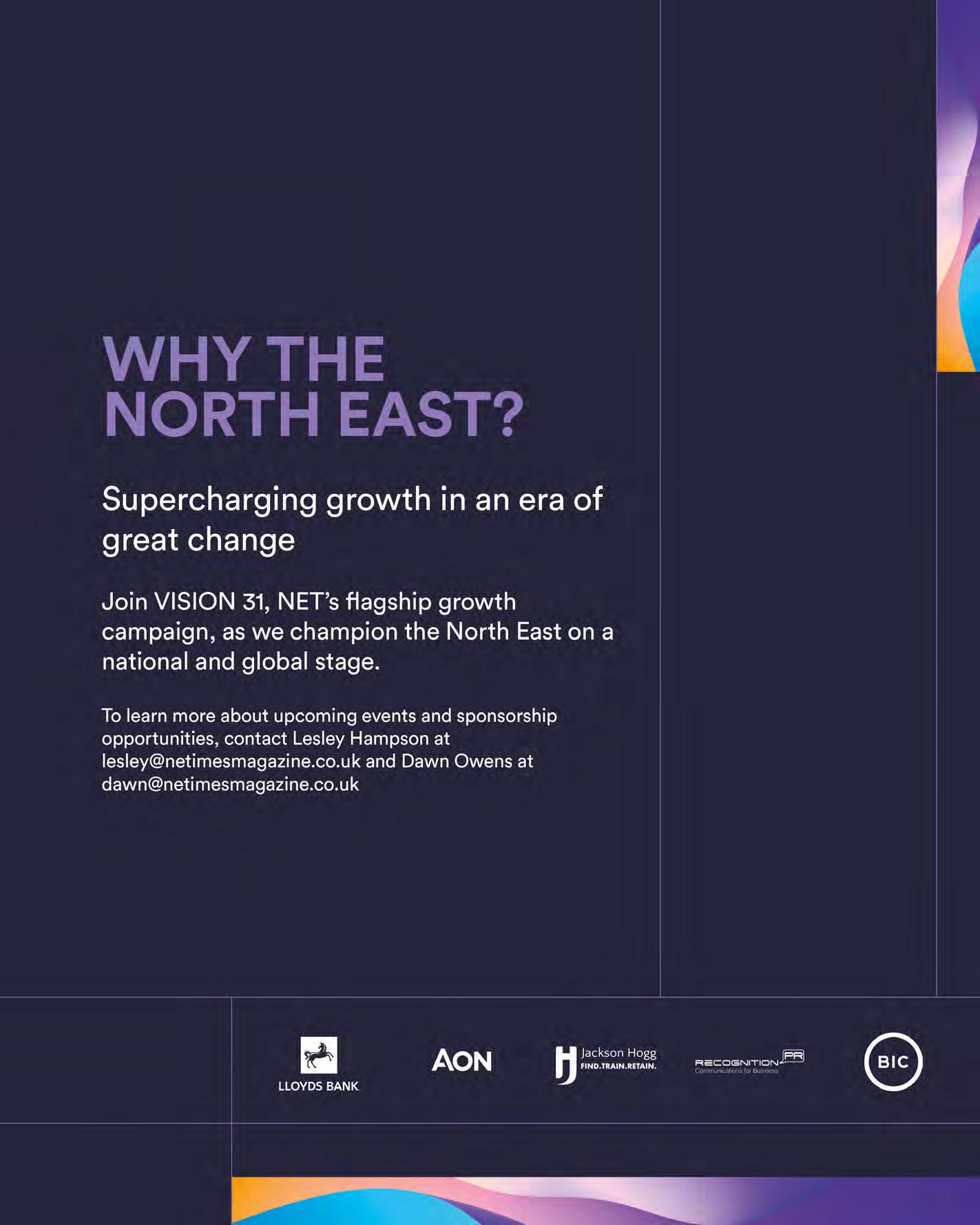
By Steven Hugill

From the Government’s backing of Heathrow Airport’s expansion to social media political grandstanding, Steven Hugill looks at some of the stories impacting the news agenda.
Help the region take flight
If life is one big circle, then we’ve come right around once again.
Or, to put it more precisely, we’ve made the final arc on the turn pad.
That’s right, after years of glossy PR campaigns and counterclaims, the Government has backed Heathrow Airport’s third runway expansion plan.
If only such projects ran on hot air, the place would have six or seven strips by now…
And that’s the point.
Heathrow’s expansion saga stretches back nearly two decades, a legacy of wavering Westminster regimes across both sides of the divide.
And until the first spade officially breaks ground – an uncertain prospect given the homes, rivers and roadways that will need to be shifted – both that timeframe and the project’s cost will only continue to rise.
It was hardly surprising a Government, in desperate need of economic momentum and public confidence, pouched the biggest ticket it could find in the Westminster investment arcade grabber.
But with such size comes great risk. And no little division too.
To many, Heathrow represents another example of a Government overheating the South East while the rest of the country shivers.
And set against the costly chaos of HS2 and fresh IPPR North figures showing the South East received the largest increase in public spending in the decade to 2023 – while the North East got the least – it’s an argument that carries real weight.
Regional projects may seem more modest prey in the aforementioned arcade grabber.
But the Government – which backed a second runway at Gatwick Airport as N magazine went to print – would be foolish to underestimate their importance.
Take the 21-mile Leamside Line between Tursdale, in County Durham, and Pelaw, in Gateshead.
Closed to passengers since Beeching’s days, and mothballed entirely after the last coal delivery trundled along its tracks in the early 1990s, reopening the rail route would breathe new life into an ailing transport network, easing East Coast Main Line congestion and extending the Metro to Washington.
And after the shambles of the Conservative regime’s U-turn on funding the scheme, it would do Labour no harm in the sentiment stakes either.
Northern Powerhouse Rail, critical to strengthening connections across the top half of the country, must remain a priority, as must work to create the North East Green Superport venture, which would unite the Tyne, Blyth and Sunderland maritime hubs, as well as Newcastle International Airport, to boost green energy research and decarbonisation.
And if Heathrow represents a long conversation, then dualling the A1 in Northumberland is a marathon discussion.
Plans to widen the route between Morpeth and Ellingham were scrapped in the October Budget.
But, as we’ve seen with Heathrow, the circle will come round again.
And with headline devolved powers now in force across the north of the region, there is little excuse for failing to deliver meaningful action that will help the region take off.
Do the right thing
Even through the blur of wiper blades shovelling heavy rain from the windscreen, it was still unmistakeable.
STARMAH OUT!
Scrawled into the grime on the back doors of a white van, it was as angry as it was incorrect.
I mean, it made a refreshing change from the usual banal football slogans and, better still, it avoided that other misogynistic cliché about the driver’s partner’s promiscuity.
But the spelling…
If you’re going to call for the Prime Minister’s
head, at least do him the decency of addressing him correctly.
Why does it matter, you might ask?
Well, it matters because it is symptomatic of a cultural change, not least across the political landscape, where fact continues to be displaced by fake narratives, where surface messaging supersedes substance and where wilful ignorance becomes increasingly ingrained.
And it is driven, in no small part, by the language of elected ministers, particularly on their social media platforms.
When Southport killer Axel Rudakubana was jailed for life, did Reform MP Lee Anderson really need to share a picture of a noose, insinuating a return of the death penalty, on X?
No, of course he didn’t.
What the situation demanded was rational thought and debate.
What the situation demanded was a rigorous analysis of the multi-agency failures that allowed the teenager to carry out such a horrific crime.
What the situation demanded was reasoned examination around wider areas such as earlyyears care and provision, and the frameworks that exist to prevent youngsters falling prey to radicalisation.
That, of course, is a complex process that requires time, thought and patience.
But when you’re an MP now onto your third party, and desperate for your voice to be heard after being ignored by all except holders of flagwaving profiles on a social media platform, you can’t wait that long.
So, instead, we got the image of a noose.
Politics isn’t a binary subject. Problems can’t be solved by a simple yes or no.
It requires nuance and an appreciation of the intricacies of each and every subject.
What it isn’t about is social media grandstanding that deliberately seeks to fuel further anger and division among sections of a country already fractured by years of political mis-steps.
Next time, put the phone down and think.
From railway pioneers to soot-covered miners, colossal seafaring vessels and roaring steel furnaces, the North East has long been a beacon of industrial purpose and progress.
That enterprising spirit and identity endures today, with firms across multiple sectors driving meaningful change in an increasingly sustainable and tech-focused world.
And as a multi-platform publisher set in the very heart of this thriving landscape, we are delighted to unveil NET 250, a campaign dedicated to celebrating the successes of the region’s vibrant business community.
Spotlighting the companies driving financial growth while innovating in an exciting new era of devolution, NET 250 – compiled from publiclyavailable data, with information taken from Companies House accounts
and business websites – will reveal the North East’s top 250 firms by turnover.
Those firms – researched in partnership with Newcastle University Business School and verified by PwC – will be unveiled at an exclusive breakfast event on Wednesday, May 14 at Gateshead’s Baltic Centre for Contemporary Art, between 8.30am and 11.30am.
From software developers to builders and manufacturers, subsea operators, professional services firms, transport and process sector companies, trade hubs and more, NET 250 will showcase the organisations delivering tomorrow’s successes today.
Crowning the North East’s number one business in front of a select audience, the showpiece will also award accolades to companies with the
highest turnover in Northumberland, Newcastle, North Tyneside, South Tyneside, Gateshead, Sunderland, County Durham and Tees Valley.
Further awards will be presented to the region’s top privately-owned business and the most recently founded company.
Steven Hugill, NET editor-in-chief, says: “The North East is a fantastically innovative and ambitious region, and NET 250 perfectly reflects that, showcasing the businesses making terrific strides across numerous sectors.
“As a multi-platform publisher deeply embedded in the North East, we have championed the region for years, celebrating its entrepreneurs and commercial success stories while casting an analytical eye across the legislative landscape to advocate further positive change.
“NET 250 builds on that commitment.
“At a crucial time for the region, where headline devolution deals have put more power into local hands, NET 250 will highlight the businesses making significant strides and the opportunities that exist to foster new commercial connections.”
NET 250 offers a number of exclusive sponsorship opportunities to help your business gain visibility alongside the region’s top 250 organisations.
The campaign has already attracted
international law firm Womble Bond Dickinson and Community Foundation Tyne & Wear and Northumberland as category sponsors.
And by joining NET 250, you too can position your brand at the forefront of innovation, growth and success, reaching new audiences across NET’s flagship platforms.
Steven adds: “NET 250 will help your business grow across – and beyond – the North East.
“Through extensive coverage across NET’s flagship print product N magazine, its sister N website and its national daily business news platform Bdaily, NET 250 will showcase your organisation to new audiences across the UK.”
Dr Fiona Whitehurst, Newcastle University Business School associate dean – engagement and place, says: “The partnership between Newcastle University Business School and NET reflects our shared commitment to championing the North East’s business landscape.
“By collaborating with NET and PwC to produce NET 250, we’ve been able to provide valuable insights into the region’s economic performance.
“The project gave our students the opportunity to gain data research and financial analysis skills, and ensures they understand the practical realities of the regional business environment they may one day work in.”
Aidan Beck, Newcastle University Business
School lecturer in accounting – and supervisor to the students researching NET 250, says: “This was an interesting research project, completed to a challenging timeframe.
“I enjoyed supervising the students as they tackled the work; it has real meaning and will be of benefit to companies across the North East.”
Richard Podd, PwC North East market senior partner, adds: “We’re delighted to be partnering with NET again to produce NET 250, which showcases a host of successful businesses operating in various sectors and industries across the North East.
“As a firm, we’re looking forward to continuing to support the region by helping our local clients solve challenges and realise their growth ambitions.”
For more information about NET 250 sponsorship packages, and to buy your ticket for the May breakfast event, contact:
Dawn Owens dawn@netimesmagazine.co.uk 07789 666437
Lesley Hampson lesley@netimesmagazine.co.uk 07748 908058

North East HR&D Awards
www.northeasthrdawards.co.uk
LinkedIn: North East HR&D Awards
The North East HR&D Awards will return in June to celebrate the organisations and people professionals making a real difference across the region’s HR and learning and development community.
The North East HR&D Awards are back!
Celebrating the outstanding organisations and people professionals across our region, the showpiece ceremony will take place at The Fed, Gateshead, on Thursday, June 5.
With a diverse range of categories, the North East HR&D Awards - which are once again supported by headline partner TDR Trainingwill shine a spotlight on the stars of the HR and learning and development community.
Following 2024’s fabulous Roaring ‘20s-themed spectacle – which attracted a record attendance and a near 40 per cent rise in award submissions alongside new event partner NET – the stage is set for another unforgettable evening.
Pete Mallon, creative and managing director of multi-platform publisher NET, whose portfolio includes the bi-monthly N magazine and national daily business news website Bdaily, says: “We can’t wait for this year’s North East HR&D Awards.
“Last year – the first with NET as delivery partner – was an incredible evening, and we’re working hard behind the scenes with organisers to create another memorable event.”
Li Xue, TDR Training chief executive, said: “We are proud to support the North East HR&D Awards in celebrating excellence in people practices.
“Investing in talent and professional development is key to driving growth and innovation, and we are delighted to champion the HR&D professionals who make a lasting impact on businesses and communities across our region.”
The 2025 North East HR&D Awards will be judged by members of the North East Work & Talent advisory board, who reflect a cross-
section of expertise and experience from organisations across the region.
Elouise Leonard-Cross and Sarah Carnegie, North East Work & Talent advisory board joint chairs, say: “We are delighted to launch the 2025 awards.
“The North East is a unique and inspiring place to live, work and thrive, and the HR&D Awards showcase the work of people professionals across our region and the organisations that are creating great workplaces and outstanding results.
“With 12 categories recognising the breadth and variety of the contribution of the people profession, we encourage organisations to share their excellent practices to celebrate their people and showcase our fantastic region.”
Alongside headline partner TDR Training, the 2025 North East HR&D Awards are proudly supported by a number of further partners, which include CIPD, Esh Group, Jackson Hogg, Northumbrian Water, NPH Group and Sullivan Brown HR Recruitment & MI-Say.
Talentheads is the event’s photo booth partner, with North East Apprenticeship Ambassador Network the evening’s programme partner.



North East HR&D Awards
For more information about partnership opportunities or to reserve a table for the evening, contact Lesley Hampson by emailing lesley@netimesmagazine. co.uk or calling 07748 908058. Alternatively, email Dawn Owens at dawn@netimesmagazine.co.uk or call 07789 666437.
FRP Corporate Finance has officially launched in the North East. Led by partners and seasoned dealmakers Abu Ali and Phil Williams, previously of WilliamsAli Corporate Finance, the venture was celebrated during a special ceremony in Newcastle’s Barluga.
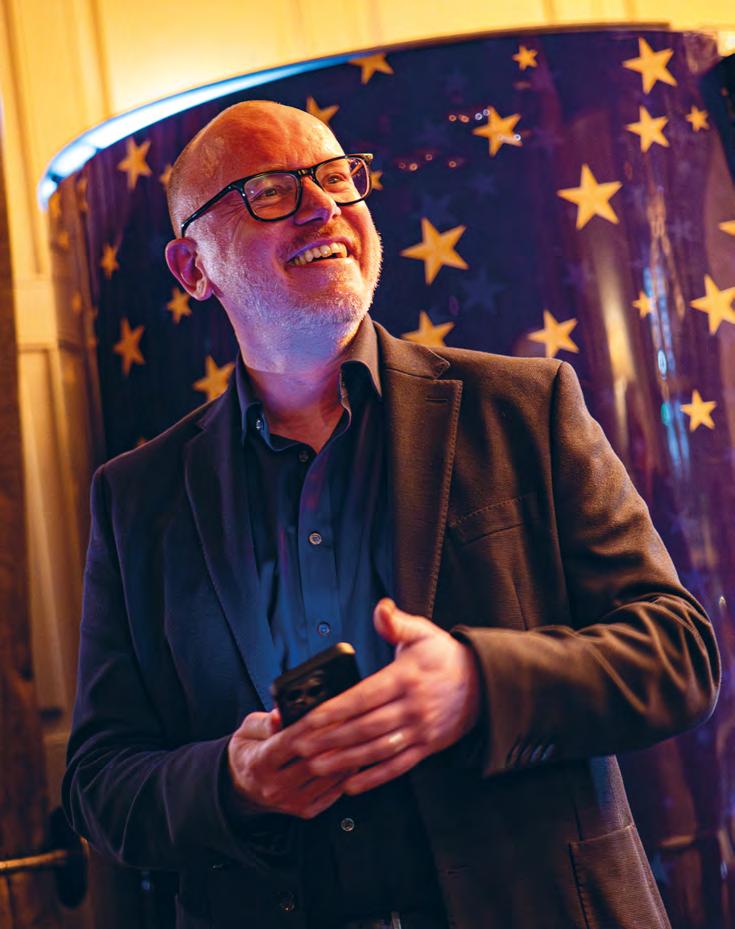
A corporate finance firm has officially launched in the North East.
FRP Corporate Finance is now operating across the region.
Partners and seasoned dealmakers Abu Ali and Phil Williams, previously of WilliamsAli Corporate Finance, welcomed more than 100 business professionals to celebrate its unveiling during an event at Barluga.
WilliamsAli was acquired by FRP Advisory Group last year, in a move the firm says will significantly enhance its corporate finance capabilities in the region and complement its strong restructuring advisory practice.
Abu said: “Phil and I are delighted to be part of FRP Corporate Finance.
“We are incredibly proud of the track record of WilliamsAli in the North East market, and we are excited about how we can build on this within the FRP group.
“With the additional infrastructure, resources and service lines now available to us, we are confident this will be a hugely positive move for our team and clients in the North East.”
Phil added: “We are delighted so many of our team, clients, professional network and friends, who have been so supportive of the growth of the business over the years, were able to join us to celebrate this milestone.
“We are looking forward to continuing to build on this strong foundation as FRP Corporate Finance.”
FRP Corporate Finance is recognised as a leading mid-market adviser, nationally closing 101 deals in 2024 with an aggregate value of more than £1.8 billion.
It was recently named a finalist in the Corporate Finance House of the Year: UK category at the Real Deals Private Equity Awards 2025.
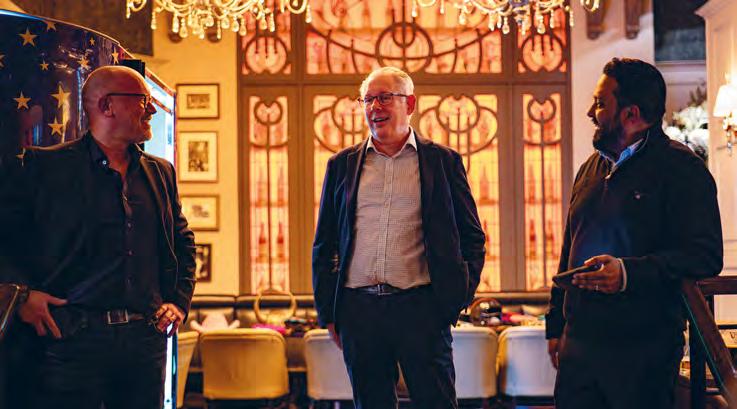

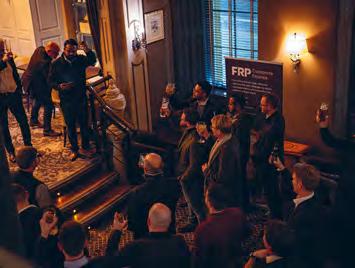



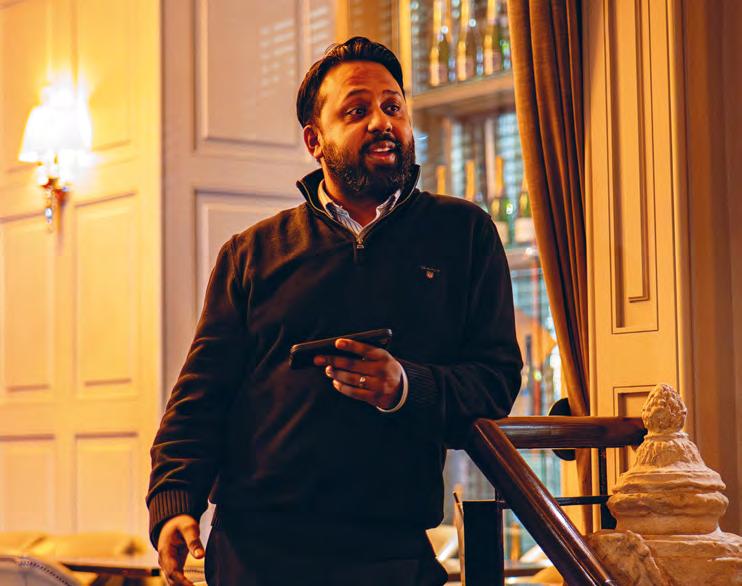
As Chancellor Rachel Reeves prepares to deliver the UK’s Spring Forecast in late March, the focus intensifies on the country’s economic wellbeing. Westminster’s latest finance chief previously ruled out delivering more than one major fiscal event a year, but given the backlash from October’s Budget, should she use the headline occasion to revise elements of her economic blueprint?
By Steven Hugill


Tim Payne Managing director of retail
Charles Clinkard
We believe stability is the cornerstone of economic growth.
The retail sector, like many others, thrives on consistency and predictability.
Constantly shifting strategies in response to political narratives has been a recurring issue for the UK economy, undermining business confidence and making long-term planning increasingly difficult.
The past few years have seen economic policies shift countless times, creating an unpredictable environment that affects everything from investment decisions to consumer spending habits.
Our approach is simple: form a coherent business plan and stick to it.
This doesn’t mean ignoring the need for flexibility, but rather committing to giving policies enough time to deliver meaningful results before reconsidering them.
Frequent revisions, particularly those driven by short-term political pressures, risk doing more harm than good.
What businesses need now is a prolonged period of stability to regain momentum and drive sustainable growth.
For retail, this stability enables us to make strategic decisions with confidence, particularly as we navigate challenges such as inflation, evolving customer expectations and rising operational costs.
With the right economic foundation in place and sustained stability, retailers can focus on adapting to change where it matters, by innovating their offering, investing in sustainable growth and supporting their workforce.

Bob Borthwick Director
Scott Bros
The Spring Forecast presents a crucial opportunity for the Chancellor to restore economic confidence, particularly in key sectors like construction, manufacturing and recycling – industries vital to long-term sustainability and growth.
Since October’s Budget, the economic outlook has darkened, with one of the major concerns for businesses being the increase in National Insurance contributions.
From April, employers will pay 15 per cent National Insurance on salaries above £5000, up from 13.8 per cent on salaries above £9100.
We estimate it will cost us an additional £200,000 per year, forcing us to undertake a detailed review of our operations that could ultimately lead to job reductions instead of investment and new hires.
The change risks stalling business confidence and economic recovery, and I would urge the Chancellor to reconsider.
While fiscal stability is important, refusing to adapt will only hinder growth and innovation.
For industries like ours, which play a pivotal role in the circular economy and net-zero transition, targeted support such as investment incentives, business rate reform and infrastructure clarity is essential.
If revisions are needed, the Spring Forecast must serve as a platform for adjustments, rather than waiting until the Autumn Budget.
In today’s economic climate, agility is as important as stability.


Mike Clark Chair
Nicola Jayne Little Chief executive
Celebrate Difference Ltd
One of the problems for all Governments is the shifting sands of public opinion and vested interests.
These are made worse by the wobbles of newly-elected MPs feeling threatened by Reform, and those wanting to take advantage of uncertainty to pursue their own political or policy interests. These pressures will, hopefully, be seen for what they are.
The Government has potentially another four years in office, and should avoid the temptation and pressures to vary or veer away from its decisions so far.
It must underline its message of consistency and stability, and remind us all that after 14 years of Tory genuflection and fudge, we have a Government with a clear plan and strategy to move the country forward.
The economy, business, community and country all need a period of consistency.
The alternative is to look at the US, and the announcement and retraction of significant economic events, to see the turmoil caused by knee-jerk changes of direction.
Our advice to the Chancellor would be to hold fast, be consistent and ignore the naysayers in her party and beyond.
A handful of months is not long enough to test the validity of her economic blueprint; we need to give her and the Government time to deliver.

Graham McDarby Managing director
Gradon Architecture
Given the Chancellor’s rhetoric so far, it’s unlikely she’ll announce any major policy decisions in her Spring Statement.
That said, she must come good on Sir Keir Starmer’s plans to get Britain building again.
The emergence of new affordable homes, offices and leisure facilities would give the economy a boost, but development is currently constrained by a convoluted planning system that needs to be streamlined and simplified.
It would also be good to see funding for energy efficiency measures in new commercial and residential buildings, as well as incentives for energy retrofit work on existing buildings.
Many of our clients are prioritising sustainable design, even those with tight budgets.
Funding to give budding architects the skills in sustainable design would also be a welcome step forward for our fast-developing industry.
Given that Government borrowing remains stubbornly high – the December borrowing figure of £17.8 billion was the highest in four years for that month – there is a concern the Chancellor could raise taxes again.
That would be a major blow to businesses already grappling with a steep hike in National Insurance contributions, and would hinder future business investment and economic growth.
Community Foundation www.communityfoundation.org.uk general@communityfoundation.org.uk @CFTyneWearNland
www.spectacle.partners
LinkedIn: Spectacle
The Community Foundation Tyne & Wear and Northumberland has philanthropy at its heart, funding grassroots organisations across the North East in support of worthy people, places and organisations. Its North East Roots Fund takes the idea one step further, by encouraging homegrown individuals, who found success outside the region, to consider donating not only money, but also their time and expertise to inspire the next generation. Here, Richard Conway, managing partner of global sports reputation advisory firm Spectacle, shares his story with N magazine, revealing why he hopes young people in the North East no longer feel they must leave the region to take their first step on the career ladder.
“I’ve always said, the most talented, enthusiastic and passionate people in the world are from the North East.
“The more you expose young people to what is possible and what’s out there, the more you raise ambition.”
Having left Newcastle to go to university, Richard Conway felt he had no option but to stay in London if he was to get ahead in his career.
Now, 25 years on, with a successful career in sports journalism under his belt, he is cofounder and managing partner of Spectacle, providing reputation management for global sports federations, club owners and sponsors.
Close family ties regularly bring him home but, with a key client involved in a high-profile sponsorship deal with a North East team, Richard has made new links with Newcastle’s business community and become a keen advocate for fulfilling the region’s potential.
He says: “The work I’m doing with our client has really showed me how the region has bloomed from when I left at 18.
think that was for me – I didn’t know how I could get there, I didn’t have any connections in the industry.
“But I saw a job advert for a researcher on the Jonathan Dimbleby Sunday programme, and I took a chance.
“My Westminster experience played a big part in getting that job, given I had no TV experience or links otherwise.”
Richard later moved to Sky News, writing scripts for live news, before taking a job that combined his two loves – news and sport.
He says: “Sport had long been a big interest of mine, so the opportunity to become sports producer with Sky News was fantastic.
“It got me out of the studio and on the road, going to major events and tournaments.
“We are delighted to highlight stories like those of Richard and Spectacle.
“So many people from the North East have been successful in their respective fields, while retaining a passion for the region’s development.
“We should be proud of our global network; together, we can build new pathways to opportunity across the North East.”
John Hollingsworth, Community Foundation chief philanthropy officer
“That growth has not been without its challenges, but I sense a real confidence in the region now.
“Pride has always been there, but there is a renewed confidence in what the North East can offer.”
Among his new connections is the Community Foundation Tyne & Wear and Northumberland, and its North East Roots Fund, which aims to inspire young people by sharing stories of success.
And Richard certainly has a story to tell.
An early foray into politics as a researcher following a post-graduate degree in international relations was rather different to his schoolboy dreams.
He says: “I’d always harboured an ambition to work in media, but growing up I didn’t really

“It’s an exciting time for the region with the Crown Works Studios in development at Sunderland, Warner Music coming to Newcastle and tech start-ups too”

“At the time, there was a lot happening with FIFA, particularly around its president Sepp Blatter.
“My politics background led me to that story, and I thought it was an amazing thing to have the chance to follow and investigate the world’s most popular game, and the men that ruled it, surrounded by controversy.”
Although still behind the camera, Richard gained a public profile as an early adopter of Twitter, now X, sharing insight into the stories behind the news, particularly the goings on at FIFA.
It also got him noticed at the BBC, which he joined in 2011 as a sports correspondent, covering the Olympics, World Cups and Champions League finals.
He stuck with the Blatter story, his persistence paying off when he emerged as the only UK journalist in the room when the FIFA president finally resigned at a Swiss press conference.
An exclusive interview with Blatter led to Richard being named Broadcast Journalist of the Year at the Sports Journalism Awards in 2015, a feat he would repeat two years later for his work covering the unifying power of football in Syria during the country’s civil war.
In 2019, after eight years with the BBC, Richard decided to leave journalism.
Having spotted a gap in the market, he moved into sports reputation consultancy.
He says: “I saw there were lots of organisations, sporting federations, football clubs – or potential owners of football clubs – who didn’t know how to manage the media or build their reputation to a mainstream audience.”
He joined forces with friend Scott Bowers, former chief corporate affairs officer of the Jockey Club, to create sports agency Spectacle, hitting the ground running thanks to their combined contacts book.
With one of those clients the aforementioned major North East sport sponsor, Richard has made a successful professional return to his boyhood city.
He says: “It’s an exciting time for the region with the Crown Works Studios in development at Sunderland, Warner Music coming to Newcastle and tech start-ups too.
“When I wanted to work in media, I had to stay in London, rather than coming home to Newcastle; the opportunities were down south.
“But now it feels like there’s a way for young people here to enter an industry and develop, without automatically leaving the region.
“It’s now on those of us in business to create jobs and offer chances to young people.
“They need to know what’s out there, and how they can get their start.
“Seeing is believing.”
Community Foundation
To find out more about the Community Foundation, its work and how you could support the North East Roots Fund, visit the website or contact the email address at the top of this article.
Raymond James
www.monument.raymondjames.uk.com
LinkedIn: Raymond James Monument
The new year may be speeding along, but it’s important to pause and give your finances an annual MOT, especially with the fresh tax period rapidly approaching. With just a few simple checks, you can maximise investments and put your finances in gear for growth. Here, Rob Brotherton, Chartered financial planner at Newcastlebased wealth manager Raymond James, Monument, highlights key points to consider.
Each year, you can add up to £20,000 to your tax-free ISA savings account.
So, if you haven’t already, you should consider using your unused ISA allowances for the 2024/2025 tax year, as well as Junior ISAs for children and grandchildren, and Lifetime ISAs for those under 40 who want to save towards their first house or for their retirement.
Ensuring these allowances are used can help maximise tax efficiency and long-term growth.
ISAs offer tax-free interest, dividends and capital gains, allowing you to shield more of your savings from tax.
Unused allowances cannot be carried forward, so if you don’t use them, you could miss out on potential tax benefits.
Pension contributions are always worth revisiting every year, if only to remind yourself what you’re paying and what you’re getting for it. You should certainly consider using up any carried-forward allowances before the end of the current tax year, assuming you have the earnings to cover them.
If you have a business, pension contributions are a tax-efficient way of extracting money from that business, especially when used in conjunction with carried-forward allowances. You’ll also get tax relief on pension contributions of up to £3600 gross for nonearners such as children and grandchildren.
So, you may have time to get some in before the end of this tax year.
And of course, it’s never too early to start putting some away at the beginning of the next tax year.
Don’t forget about Venture Capital Trusts.
Raymond James, Monument
For more information about Raymond James, Monument and how its expert team could help map your financial future, email RJUK-Monument@ RaymondJames.com or call 0191 303 4260.
The information in this document does not constitute advice or a recommendation, and you should not make any investment decisions on the basis of it.
In addition, Junior ISAs help parents save for their children’s future, while Lifetime ISAs provide a 25 per cent government bonus for first-time homebuyers or retirement savings.
And looking just a little bit further ahead, you can also use your ISA allowance for 2025/2026 at the start of the new tax year on April 6, 2025.
Whether you deposit a lump sum, or make the first of a series of regular payments, this will give your cash more time to grow compared with leaving it until the last minute.
These can form part of a tax-efficient investment plan, though they do tend to come with more exposure to risk, so they’re not for everybody.
They generally give you the option to support small, high-growth companies, with up to 30 per cent income tax relief on investments, as well as tax-free dividends and capital gains tax exemption on profits.
By diversifying across a range of early-stage businesses (while balancing with more conservative investments) you can attempt to spread your exposure to risk, balancing tax efficiency with increased potential (but no guarantee) for growth.
It’s good advice for this and any year, but it’s worth repeating – regular savings in a secure, low-risk environment tend to grow in a slow but steady fashion.
And if you don’t have the wherewithal to put away large sums in the near future, saving smaller amounts on a regular basis is worth considering in addition to larger, more focused investment sums.
Don’t forget to check your regular expenses.
Are you still getting the best deal on your utilities, mobile phone, television and insurance rates?
Remind yourself what all those little payments on your bank statement are for – it could be that you stopped needing some of them ages ago, or they’re no longer as important as they were.
And what about pension payments and investment opportunities – could you do better this year than last year?
At Raymond James, Monument, we take a local and personal approach to your financial plans and investments.
Our team members have been an integral part of the North East business scene for many years, and we pride ourselves on the level of service and returns we’ve achieved for our clients.
We know one size never fits all, and once we get to know you, we’ll endeavour to help you make the right financial and investment decisions for you and your financial goals.
Get in touch for a free, no-obligation chat.






Dicksons is one of the North East’s best-known family businesses, with its famous saveloy dips, mince and pork pies, sizzling sausages and pease pudding having satisfied tastebuds for decades. But times change, and to maintain its market standing in a constantly evolving world, the business has undergone a rebrand, refit and reinvigoration, to embrace new customers while continuing to cater for its traditional fanbase across its 34-shop estate. Here, Colin Young visits Dicksons’ South Shields factory and a nearby high street store to learn more about the business and its commitment to delivering great food every day.
Words by Colin Young
24,000 sausages sold in Dicksons sandwiches a week
Breakfast. The most important meal of the day.
And at Dicksons, it’s so important, you can get one all day – bacon, sausage, egg and hash browns, all ready to go on the hot plates.
The MI Dicksons journey started about half a century before the company’s actual formation in 1953, when Fritz Kuch left the family farm in southern Germany and moved to the North East.
Just after the Second World War, Michael Irwin Dickson started an apprenticeship with a pork butcher in Howdon, where he met Fritz’s daughter Helen.
And so the Dickson family and brand began.
The couple set up their first shop in Prince Edward Road, in South Shields, in 1953.
It’s still open, busy to this day, and will undergo one of the first refits under the firm’s new brand, which includes the ‘Making Your Day Since 1953’ tagline, a nod to the rich history of a company established to provide meals for working-class families throughout the day.
The bright red lettering may be a return to the Dicksons original butcher shopfront, but times, tastes and shopping habits have changed, with the company’s first newly-branded store in Blyth emphasising the broad range of products
beyond its founders’ traditional wares.
Supermarkets cater for the majority of those customers now.
The flat above the shop where Michael Dickson lived as a toddler, while his parents built the business, is still there, but is no longer a family home.
Company chair Michael is 73 and still working.
“I was always very fond of the business and the people,” says Michael, posing for a photoshoot alongside daughter Elena and son Mike, the firm’s third generation.
He adds: “It was an extension of home life.”
Throughout N magazine’s time at Dicksons’ South Shields factory and nearby Horsley Hill store, Michael is constantly moving us to keep a clear route for customers from high street to fridges and the sandwich bar.
He says: “The first home I remember was above the shop, back to when I toddled, and I’ve been here – with the company – ever since.
“My father died when I was 14, and there was only me, my mum Helen, Christine – my older sister by a year – and younger sister Dorothy.
“I really don’t know how my mum coped, but she was resilient and Christine had to grow up quickly and help her run it.
“We had to be very conscious of the business, which employed more than 30 people then, so it was a huge responsibility and one we didn’t ask for.”


One of Michael’s first tasks after his father’s death was to replicate the recipes he had been using from day one.
But, as he’d never written them down, it took weeks to perfect the measurements of the spices and meats.
Today, though, it isn’t just the products requiring recipes.
In a world where software dictates so many lives, Dicksons must too continue refining its technological techniques to remain a tasty proposition across online platforms.
Indeed, product and marketing director Elena’s grandfather Irwin never had to worry about hits, clicks and likes on the Dicksons’ social media accounts, or the importance of QR codes.
But then neither did Elena when she joined the company 20 years ago.
“It is time-intensive and also very important,” she says, checking her phone.
She adds: “Online is where our new customers are, and it’s about reaching out to student-age people and young families, and finding a way to be attractive to them.
“I think people know us and know the quality we provide, so it’s about telling them about our whole product range, tapping into a younger audience and trends while bringing our traditional customers with us.”
MENU DINNER
Annual tonnage of pease pudding 389,376 kilograms
Annual tonnage of cheese savoury 79,352 kilograms
Pastries, pies and rolls, the famous saveloy dip, the lunch deals – pie, chips and gravy – full fridges, freshly-made sandwich packs and rolls, salad bowls, vegetarian options…
Dinner is catered for. And then some.
The second Dickson generation took control of the business five years after Irwin’s death and, after Christine initially took the reins, Michael joined after completing his A levels.
He says: “It was a very strong business, but naturally without direction, and we blundered around in the dark for a bit.

“Christine blundered less than me because she was in earlier and was a very bright lass and very good at things I’m not very good at, which was accounts and paying people – the very fundamentals if you want to run a business.
“She was formidable; I remember people telling me they were terrified of her.
“We offset each other.
“We sound like the perfect team, but we were worse in private.
“Like any teenage pair, we used to fight and couldn’t bear to be in the same room sometimes.
“But then it was us against the world, right?
“It really was, and we got on with it, we got through the tough times, and we built a fantastic business.”
They bought a second shop within three months in Ocean Road – redefining and redesigning it into an all-day butchers and deli –before expanding further into Wallsend.
There’s a black and white photo in the new Dicksons brand book of a beaming Christine beside North East comedy legend Bobby Thompson at the opening in 1978, surrounded by giggling housewives.
Michael says: “It was like going to the moon.
“We were no longer in our comfort zone, and it was completely different and a great learning curve.”
The company’s expansion prompted the purchase of its first factory and storage base in South Shields, where it remained for ten years, buying 11 shops and establishing the Dickson range as one of the best in the region.
Then, anticipating significant legal changes to food hygiene and preparation under new EU regulations in 1990, Dicksons moved again to its current headquarters off Boldon Lane.

It’s here where the meat magic is done.
Michael says: “We decided to go for this greenfield site, as it was then, but to pay for it, we had to grow further.
“I bought two companies who did nothing but wholesale work, which took us into a completely different market and began something of a treadmill.
“The ambition was always to get from A to B; it was never really about getting rich quick.
“That wasn’t the thing. It was to fill an ambition, to feel as though you’d lived and you’d done something, and I think we achieved that.”
And keeping it in the family was just as important.
Two years after setting up a family council, Dicksons was named Coutts’ UK Family Business of the Year in 2010.
Today, Elena is partnered by retail growth and development director Mike, who returned to the North East in 2016 after working as a pharmacist in Manchester.
Their siblings Daniela and Matthew have decided to pursue their own careers in clinical research and medicine.
Chris Hayman joined the company in 2014, after 16 years with McDonald’s, and two years later became managing director, the first non-family board member, with Michael as semi-retired chair, where he remains.
Chris says: “Michael’s pretty much been in charge since he was a teenager, and we all respect that and understand the responsibility we have to take the business forward.
“One of our challenges is making sure he gets the right information at the right time, and assure him all the systems he put in place that made the business successful are still there.
“But he loves the detail, and that’s harder the further he moves away.
“It’s always interesting, and we feel we’ve done alright the last five years.”
Elena’s taste for the food business began with her maternal Italian grandfather’s ice cream parlour and further stints in the factory, shops and offices of her dad’s business.
She rejoined after completing a food science degree and graduate scheme with United Biscuits, in London.
She says: “Saturday’s in the shop, holidays in the factory.
“The ice cream parlour closed when I was ten, but we spent Saturdays there as children.
“I suppose my love of food was inevitable, as I was exposed to it on both sides of the family –ice cream on one side, pies and sausages on the other.
“What’s not to love as a kid?!”

Today, there are 34 shops, and plans are in place to reach as many as possible by the end of 2030, with each one bedecked in the company’s new design.
Mike has overseen the projects.
He says: “Everyone loves a shop-fit, don’t they?
“Everyone loves something new.
“The biggest benefit is that it is easier for the staff; more efficient and better functioning because a lot of them are very hard to work in.
“If they’re happier and serving with a smile on their faces, that can only help.”
The colours on the bags and wrappers may have changed, and the strapline too, but the food inside is as good as ever.
Mike says: “Nothing is fundamentally changing.
“We’re just showcasing what we do better, and that’s been part of the problem.
“People don’t shop like they used to; they don’t go to the butchers, the bakers and the candlestick maker.
“They can do it all under one roof.
“People aren’t coming in for meat anymore, so that display has to shrink.
“We’re trying to evolve with what we are and what we’ve become.
“But we’ve not lost our heritage, our recipe or our quality.
“We’re still the same, we’re just shifting with the times.
“We feed people. That’s our purpose and has been the crux of our business since it was founded.
“Back in the day, it was the miners and the shipbuilders.
“Obviously, jobs have changed, but our purpose and quality haven’t.”
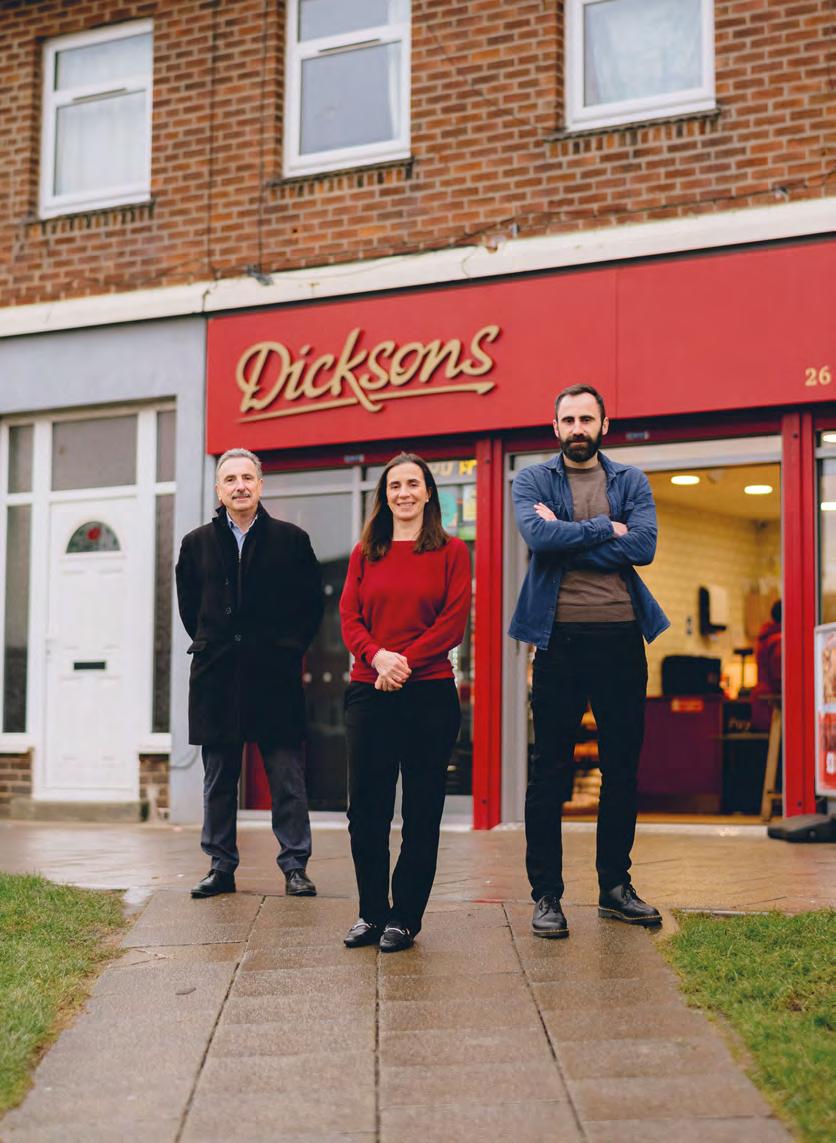
MENU
TEA
Items sold
1.5 million saveloys a year
1.5 million pots of pease pudding a year
26,600 mince pies a week
12,700 pork pies a week
Take-away time. Hot or cold, the most substantial meal of the day, is here.
Irwin Dickson pulled his red curtain across the shopfront after his lunchtime rush, but the 2020s’ all-day service – still the good, affordable meals Irwin provided – are very much part of Dicksons’ future.
The factory is a labyrinth of white walls, wellington boots, vats of raw meat, vegetables, spices and endless trays of pastry, waiting to be turned into Dicksons’ daily delights.
It’s a huge change from the time Michael watched his father at work in the butchers, but he loves every second down here – and staff who have been with the firm for decades clearly love to see him too.
He still knows all their kids’ names, and which football team they support, though it’s getting harder as their numbers increase.
Like many in the sector, Dicksons was hit by the surge in energy prices – even with the benefit of a long-term contract – and the latest Westminster Budget has presented new challenges.
In the offices upstairs, Chris says: “We want new customers to try us, and we want the staff and the customers to come on a journey with us and spread the message that we can make your day with good food.
“We have a lot of staff who have been with us for a long time, and customers who’ve trusted us for generations; they’re up for it, they like what we’re doing.
“It’s a big and exciting challenge.
“We’ve taken our time to get the rebrand right.”
Mike says: “The hard bit starts now.
“It’s about explaining that the store gives a sense of what and who we are; our character, our company and warm, quality food.
“We’re not fancy, but we do things well and we do them right.”
Elena adds: “I don’t think we should ever underestimate how well we’ve done, through some really difficult and turbulent times.
“We’ve survived, so we must be doing something right.
“And we can improve.”
Hay & Kilner
www.hay-kilner.co.uk
Instagram: @hay_kilner
LinkedIn: Hay & Kilner
With a strong 12 months of deal activity having fuelled its progress, Newcastle-based law firm Hay & Kilner entered 2025 with great confidence. Here, Ben Jackson, senior associate in the firm’s corporate team, looks back at a buoyant year of mergers, acquisitions and cross border activity, and shares his outlook for the coming months.
Reflecting on 2024
Throughout 2024, we found a high quality and quantity of deals, seemingly driven by a combination of tax changes, consolidation and the expansion of emerging sectors.
One of the team’s stand out deals was advising an innovative North East software brand, operating in the iGaming sector, on its multimillion-pound sale to a Danish digital sports media group.
Copenhagen-headquartered Better Collective A/S, dual-listed on the Nasdaq Copenhagen and Nasdaq Stockholm, bought AceOdds in a €42 million deal in a bid to significantly enhance its presence across the UK.
This transaction was consistent with a trend we saw throughout the year, with increased activity in the software and technology sectors and some interesting multiples.
Another highlight was acting for the shareholders of Durham-based Indigo Software on its sale to US-headquartered Aptean Inc, a global provider of industryspecific software.
This was yet another example of the region’s impressive output in the software sector and another cross-border transaction.
We had supported Indigo Software across a number of areas, including corporate, commercial contracts, intellectual property, employment and commercial property, putting us in a great position to work efficiently and deliver the best result for shareholders.
Towards the end of the year, we acted on the sale of Wingrove Motor Group to Arnold Clark.
Wingrove is another long-standing client we had worked closely with on the commercial and private side over the last two decades.
The deals were a pleasing combination of working in fast-moving sectors, while maintaining our ethos of partnering with businesses over the long term, supporting them on their journey across a range of disciplines.
As a general trend, we saw an increase in shareholders selling to employee ownership trusts, working closely with our private client team in the process.
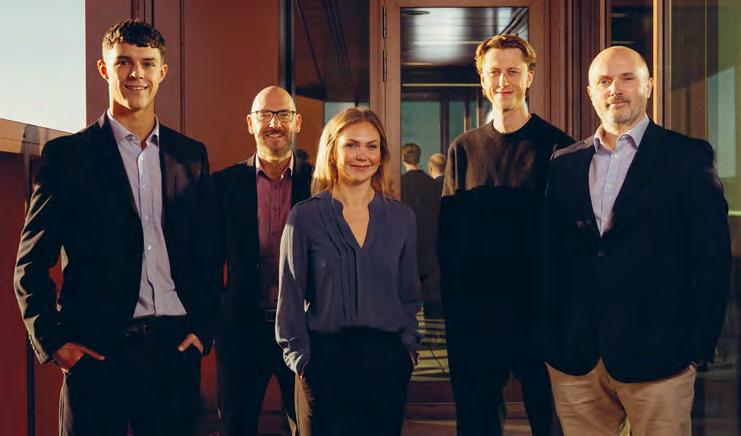
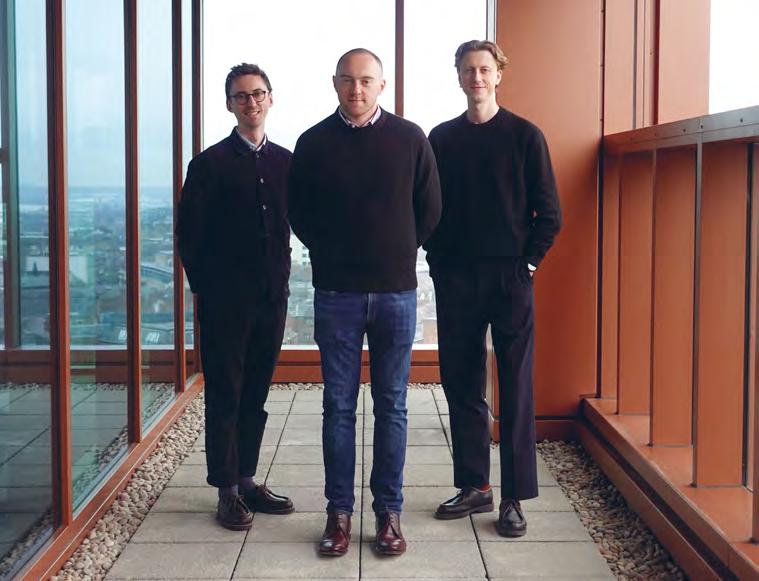
Employee ownership trusts can offer a longterm, commercial succession plan to certain business owners with associated tax benefits.
We find employee ownership trusts can be very effective, provided they suit the culture and outlook of the business and its shareholders.
As well as activity in the emerging sectors of technology and software, we saw good levels of activity in more traditional areas.
In addition to automotive, we have a strong reputation in the care home sector, and we continued to see consolidation in this area.
From a regional perspective, our commercial teams anticipate continued expansion in the hospitality and leisure sector.
We have seen a strong start to 2025, with a number of ongoing deals and investments paired with a strong pipeline.
Towards April, it will be interesting to see what impact the planned CGT changes have.
The changes to Business Asset Disposal Relief this April, and again in April 2026, may accelerate the timeline for certain transactions,
though not to the same extent as the 2024 Budget.
While the deals market is always hard to predict in the context of wider economic changes, there is a lot of cause for optimism in the North East and further afield.
There is a resilience and buzz in the region across the business and professional community.
This year, we are already seeing a real appetite from business owners to seek out opportunities for growth through funders and investors, as well as those ready to extract value through trade sales and management buyouts.
Our advice to clients is to prepare for transactions of any nature as early as possible.
Business owners should seek advice and equip themselves with as much information as possible to make informed decisions and allow them to meet the challenges of transacting.
Trusted advisor
We understand the strategic objectives of our clients, acting as trusted advisors and always taking a proactive and holistic approach.
As a full service commercial firm, we are well placed to help clients on all aspects of their business and personal journey.
“We find employee ownership trusts can be very effective, provided they suit the culture and outlook of the business and its shareholders”
Hay & Kilner
For more information about Hay & Kilner and the services it provides, visit the website at the top of this article or call 0191 232 8345. Alternatively, contact Ben Jackson at ben.jackson@hay-kilner.co.uk
Nexus
www.nexus.org.uk
@My_Metro
Cathy Massarella, managing director of Nexus, is leading the organisation into a bright new era. Here, Cathy tells N magazine of her excitement at delivering the new Tyne and Wear Metro trains, and her commitment to creating an inclusive and diverse workplace culture in a traditionally male-dominated sector.
The Tyne and Wear Metro is one of our region’s most familiar brands.
For more than 40 years, it has been at the heart of local public transport, carrying millions of people to places of work, leisure and education.
It’s a key driver of social mobility and connectivity.
Nexus is the public body that runs Metro, and Cathy Massarella became managing director in 2024.
She is the first woman to hold the role.
After graduating from Liverpool University with a degree in economics and accounting, Cathy completed an initial four-year stint in banking and finance.
However, since then, her career has focused on everything public transport.
She has managed the operational and project


delivery of bus and ferry services, heavy and light rail operations, transport infrastructure, ICT and information provision in both the private and public sectors.
Only airlines are missing from her portfolio.
As a qualified and practising project manager, she became Nexus’ first major projects director in 2020 and is now managing director, overseeing a multi-million-pound budget and all of the transport services that Nexus delivers, not least the Metro system.
She says: “I’m proud to be managing director of Nexus, and excited to lead the organisation into what I see is a very bright future.
“Nexus has a vital role to play in the transformation of public transport networks.
“I’m working closely with the North East Combined Authority, our key stakeholders, local authority partners and the wider transport industry to deliver more for the people who rely on our services,” says Cathy, who is originally from Doncaster.
She adds: “Good public transport is key to our
Nexus was official travel and accessibility partner of Northern Pride 2024, a move that further highlighted its people and culture and diversity and inclusion strategies

region’s success, helping to deliver jobs and economic growth, and providing vital links across our local communities.
“This is an exciting time as we press ahead with the introduction of the new Metro trains, which are going to be transformative for customers in terms of comfort and reliability.
“Bringing this historic project to fruition is a key aim over the next two years.
“As well as the huge investment in our new Metro fleet, we continue our ongoing investment in our Metro infrastructure, with the next major focus being a new signalling system, to ensure the continued safe and smooth running of our trains long into the future.
“We’ve spent more than £400 million since 2010 on renewing and updating Metro infrastructure, and I’m keen to see that continue.
“Working with the North East Combined Authority, extending the Metro to Washington, remains a strategic goal.
“I look forward to seeing the business case develop as we seek Government backing for what would be a transformative project, and the first step in resurrecting the Leamside Line.”
The new Metro train fleet is the biggest project Nexus has undertaken since the system was opened in 1980.
Nexus is getting 46 new Metro trains, built by the Swiss manufacturer Stadler.
Cathy says: “The introduction of the fleet is going well.
“We expect to see them all in service over the next two years.
“The new trains are a game-changer; they will deliver greater reliability and revolutionise the customer experience.”
Cathy says it is the people behind Nexus that are key to its success, and she is currently focused on creating an engaged, inclusive and agile workplace culture that welcomes and retains the best talent.
She says: “Our focus is shifting, from talking about transport and networks, to prioritising people, both the people who use our transport and the people whose skill and dedication keeps them running.
“Engaged and involved colleagues offer a better service and experience to our customers, and that’s ultimately what it’s all about.
“Our approach is defined by our people and culture strategy, and our diversity and inclusion strategy, which have been developed with colleagues.
“Despite being a very male-dominated industry, female senior leadership has increased at Nexus from zero to 40 per cent since 2020 - a stat I’m particularly proud of.
“A new approach to employer branding, resourcing and onboarding has also been positively felt across Nexus.
“We have been able to attract and hire employees from a diverse range of industries.
“Our apprentices are performing incredibly well and there have been more career pathways developed through secondments, promotions and project work.
“Our future certainly is bright.”
Nexus For more information about Nexus, its services and its workplace culture, visit the website at the top of this article.
With International Women’s Day returning in early March, the occasion once again highlights the vital importance of gender equality in the workplace. While progress has been made across the business landscape, much work remains to be done. Where do you believe positive change has occurred, and where must further action be taken to deliver a fairer and more balanced commercial sector?

Laurie Thomson Marketing and communications manager SMD
International Women’s Day is an important celebration.
It’s a reminder that with diversity comes balance, and that equal representation within businesses is an essential component of success.
For me, working in a male-dominated industry has provided a unique vantage point to observe progress while acknowledging the steps still to be taken.
Despite making up 50 per cent of the population, women in the UK represent just 29 per cent of the STEM workforce.
Although this number must increase, it represents a positive societal shift, which we have benefited from first-hand at SMD.
Across our 250-strong team, more women occupy technical roles than ever before.
This is testament to the changing perceptions that years of activism have unlocked.
Progress – albeit slow – is visible.
I believe our attitudes are directly linked to industry representation.
Research shows children establish views on gender roles by the age of seven, and this acts as a barrier for girls considering STEM careers.
At SMD, we are passionate about engaging with primary school children, giving careers talks and inspiring excitement about STEM.
Last year, while celebrating Women in Engineering Day, we ran a competition where local pupils were encouraged to draw an engineer to challenge stereotypes and foster inclusivity. We also regularly exhibit at STEMFest, an interactive event that showcases the joys of a STEM career.
Teaching young people that they can achieve anything, regardless of gender, will help us reap the rewards of a balanced workplace.
Sometimes, I see gender equality mistaken for encouraging women to ‘do it all’ – juggling personal and professional commitments by reducing hours, adapting shift patterns or sacrificing a social life.
In reality, creating equal opportunities means normalising shared responsibilities.
We must open up a wider conversation about distributing personal and family commitments so that everyone, irrespective of gender, thrives.
While businesses play a key role in inciting positive change, I believe becoming an equitable society requires a macro-level shift.
Maternity pay, paternity leave and childcare provisions are just some of the policies that remain disconnected from the day-to-day needs of families.
Inadequate social infrastructure is stunting opportunities for women, preventing them from pursuing career ambitions alongside family life.
Addressing this gap is an essential component of an inclusive workforce.
This International Women’s Day, I encourage everyone to celebrate progress while continuing to ask, ‘how can we do better?’

Patti Burt Senior business development manager | Leader of the PD Ports Women’s Network Group PD Ports
Women are significantly under-represented in the port and maritime sector, with studies showing they account for only 11 per cent of the industry workforce.
Of that number, it is estimated fewer than one per cent are working in operational roles.
That historic imbalance is one the port sector has made moves to improve in recent years – the industry is a drastically better place for women than it was when I started my career.
But there is work still to be done.
From poor facilities for women, to outdated attitudes by some of the male workforce and an unconscious bias many women still hold about their own ability to take on ‘men’s roles’, there are plenty of challenges before the UK port sector can be considered truly welcoming to women.
creating that space to freely discuss issues, big and small, female specific or not, is so important.
PD Ports – owner and operator of Teesport – has a strong track record of empowering women and encouraging individuals to develop their careers; we want to see people push themselves forward and try something outside their comfort zone.
We’ve hosted special events with women from across the business, each in different roles, so they can speak about their career path and the challenges they’ve faced along the way, to spark conversations and inspire others.
One of our key projects is to tackle the lack of good PPE available for women – we’re still too reliant on PPE designed for men’s bodies.
Join the discussion
Scan the QR code below to visit our LinkedIn page and add your thoughts to the conversation.
For my own part, I used to be timid, a people pleaser, but over the last 19 years, working in the sector, I’ve gained confidence and I’ve seen things that made me think, ‘hang on, that’s not right, that needs to change’.
And so, encouraged by Liz Law, PD Ports’ chief financial officer – and first female board member – I forged ahead with setting up the Women’s Network Group, bringing women and male allies from across PD Ports together in the spirit of action and collaboration.
In an otherwise male-dominated environment,

I want to make sure every woman who joins this business and goes to the stores on her first day, can find every bit of kit she needs, in a size and shape to adequately fit her, just like her male colleagues.
While International Women’s Day is a chance to put a spotlight on key issues, to really make a difference needs consistent, meaningful action for the long-term.
If being part of the Women’s Network Group at PD Ports gives one person the confidence to speak out, or change their career to the road less ordinary, then we’ve done our job.
Creating a blueprint for success across the north of the region’s new political landscape
As North East mayor Kim McGuinness continues to introduce policy to shape the north of the region’s £4.2 billion devolution future, attention intensifies on the measures required to catalyse significant economic and social progress.
Here, in the fifth of a series of executivelevel roundtable discussions held by N magazine publisher NET alongside Fairstone, the UK’s fastest-growing wealth advisory firm, business leaders set a template for mayor McGuinness and the North East Combined Authority to create lasting prosperity.
Words by Steven Hugill
This is an abridged version of the full roundtable discussion, which you can read by visiting www.
How can the north of the region fully capitalise on its devolved powers?
For as long as discussions about North East devolution have echoed through the region’s corridors and council chambers, so too have calls rung out for officials to look westward for inspiration.
Sir Howard Bernstein, Sir Richard Leese and Andy Burnham, long credited as the architects of Manchester’s transformation from ‘Cottonopolis’ to a thriving advanced manufacturing and technology hub, remain frequently cited as figures for emulation.
However, Lee Hartley, founder and chief executive of event host Fairstone, the UK’s fastest-growing wealth advisory firm, said: “We must fight the battle on the ground on which we know we can win.
“We shouldn’t mimic Manchester, but we can mimic its scale of ambition.”
Stephen Hall, senior office partner at international professional services firm Deloitte’s Newcastle office, added: “Manchester is a different proposition.
“Ben Houchen has had a big impact on Teesside, through the Tees Valley Combined Authority, and there are fantastic opportunities for Kim McGuinness to do the same in the north of the region.”
If transplanting Manchester’s model onto the North East is unfeasible, what template should the region’s regeneration bosses use to maximise the opportunities afforded by devolution?
Charlie Hoult, boss of fourth-generation,
Newcastle-based business village Hoults Yard, said: “If you spread the jam too thinly, you don’t get anywhere.
“Rather than trying to make the North East another Silicon Valley, we must bring our unique DNA crystals together.
“We know artificial intelligence research isn’t going to happen here, so let’s bet on the things with which we can win.”
A fundamental element of any growth programme is a robust transport system. But is the North East’s travel network sufficiently strong enough to help drive prosperity?
Despite being the birthplace of rail travel and home to the UK’s largest car making plant, the North East’s transport network remains something of a paradox.
And roundtable members warned that until its road, rail and air network is sufficiently strengthened, the North East will fail to fully grasp its commercial potential.
Stephanie Marshall, a digital transformation lead at Darlington-founded, global project management and cost consultancy firm Turner & Townsend, called for a prioritisation of civil projects to lay foundations for better connections.
She said: “People sometimes like to see buildings rising from the ground, but a lot of the things we need will be buried underground.
“We need better infrastructure – things like highways work and rail improvements – which will make the region both easier to travel to and better to navigate.
“And we need businesses to come together and have a voice on what is needed.”
A strong skills base is equally crucial to any commercial blueprint. What is the present picture across the learning landscape, and how can the region’s devolved powers be used to help create a stronger talent pipeline?
As the world continues to shift to a more sustainable future, the demand for a workforce equipped with skills to match the pace of change has never been more critical.
And Richard Bradley, who recently switched from managing director to executive chair at Dyer Engineering, which runs sites in Annfield Plain and Harelaw, near Stanley, County Durham, called for a closer relationship between businesses, educators and combined authority officials.
He said: “Skills is one of the biggest challenges for manufacturers, and we need to be involved in conversations to help identify a strategy that makes the sector a viable employment opportunity.
“A lot of people still think, ‘it’s a factory, it’s dirty and it isn’t much fun’.
“But that isn’t the reality, and we need to work with the North East Combined Authority to highlight that.”
Jonny Catto, managing director of Gateshead and Tanfield Lea-based thermoformed food packaging maker iPac, added: “The
manufacturing sector’s reputation as a career choice has gone downhill. A lot of younger people now want to work in other industries like tech.
“We need to get school-leavers looking at manufacturing as a good opportunity.”
How important a role can devolution play in helping attract greater investment to the region?
Central to any business’ success is the pairing of market-leading ideas and services with a similarly strong and sustainable approach to recruitment.
Equally crucial is finance.
And roundtable members advocated an “investment ladder” between early-stage, scaleup and mature businesses, which they said would provide easier access to capital.
Becky Crow, head of projects at Newcastlebased life sciences firm LightOx, which is developing light-activated treatment for early-stage mouth cancers and a light-based, antimicrobial treatment for wounds, said: “Success through devolution would include a vibrant life sciences community.
“At present, there aren’t enough adequate laboratory facilities and spin-out companies are struggling to find space.
“But a funding ladder would help start-ups find property to grow in the region, rather than moving elsewhere.”


“The manufacturing sector’s reputation as a career choice has gone downhill; we need to get school-leavers looking at it as a good opportunity”
Jonny Catto, iPac managing director

“Success through devolution would include a vibrant life sciences community; a funding ladder would help start-ups find property to grow”
Becky Crow, LightOx head of projects
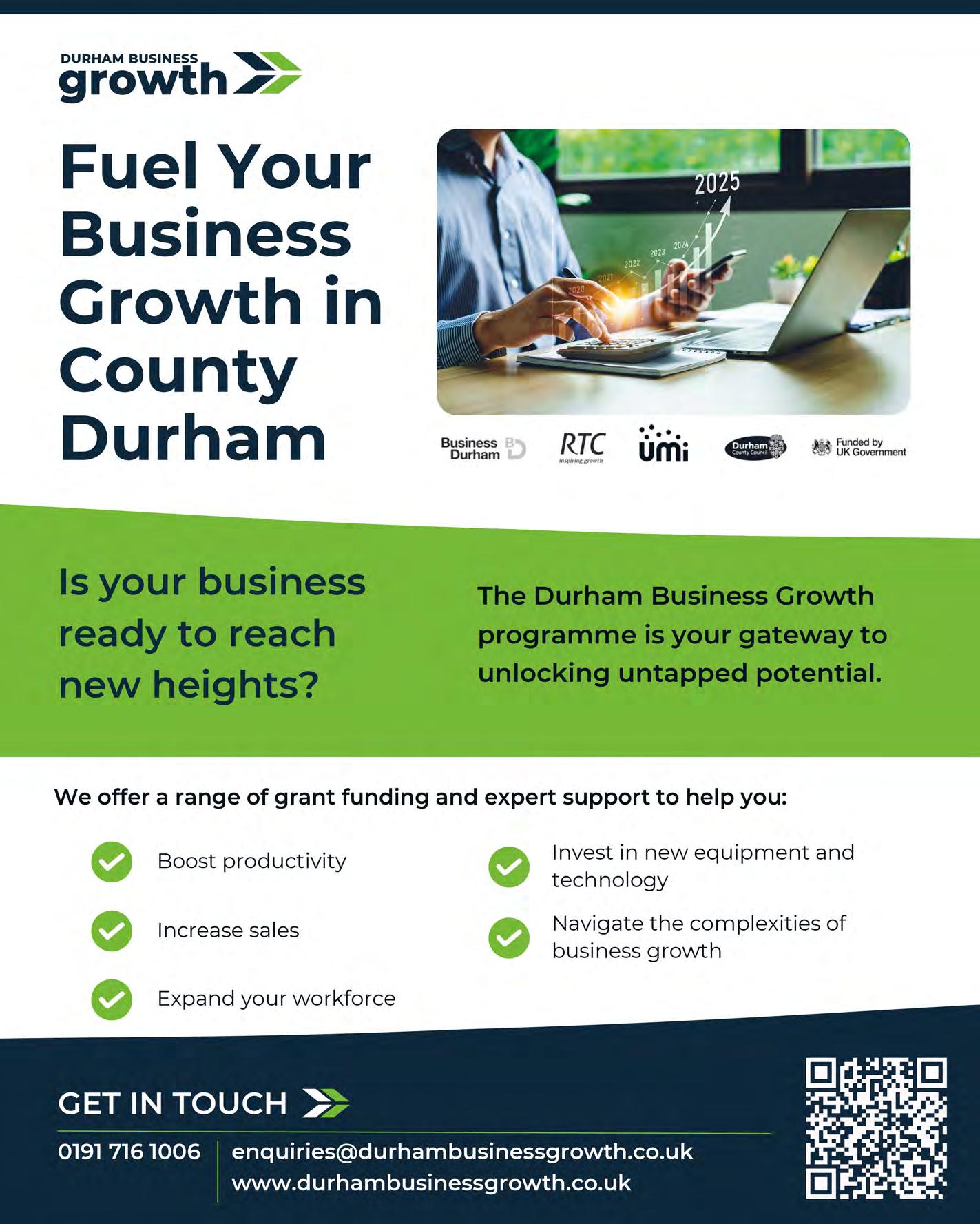
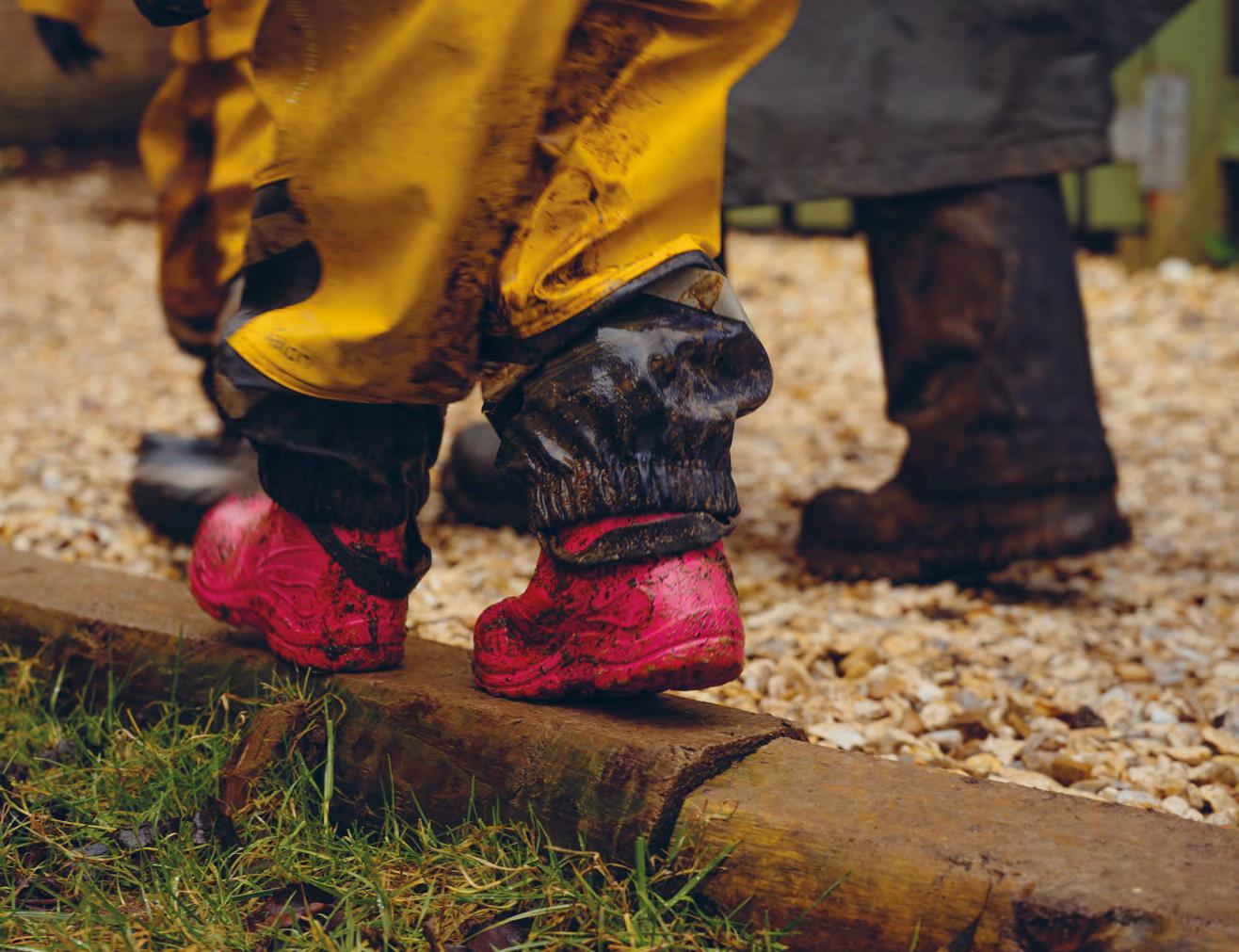


Hello and welcome to a special skills supplement, writes N magazine editor Steven Hugill.
The North East is a rapidly evolving place.
From mayoral-led devolution deals to flagship arts investments and next-generation advances across the manufacturing, clean energy, digital and healthcare and life sciences sectors, the region is at the forefront of change.
And crucial to maintaining its momentum will be a robust skills framework, one built on greater collaboration between industry and education to ensure tomorrow’s workforce is truly equipped to meet future demand.
This supplement channels that focus, featuring individuals and organisations who are already driving positive change.
It includes Hannah Atkinson, whose Castle Eden Dene-based Open Air Education venture is rewriting the region’s learning landscape.
Introducing a model already proven in Scandinavia, Australia, New Zealand and South Africa, the endeavour replaces the traditional classroom with woodland and beach-based tuition.
And it continues to prove increasingly popular.
Indeed, such is the strength of demand that Hannah is now looking at further expansion.
We also chat to Tania Cooper, chair of the North East STEM Foundation.
In a world where clamour for work-ready individuals with strong science, technology,
engineering and mathematics (STEM) backgrounds has never been higher, the organisation is playing a key role in helping youngsters develop the skills required by industry.
Tania reveals how the Foundation’s handson approach, supported by its many industry partnerships, is bolstering learners’ opportunities.
Elsewhere, we focus on Esh Construction, specifically its social value work in the communities it serves.
We speak to Kate Marshall, the contractor’s social value manager, who provides insight into its Constructing Local strategy, its award-winning Building My Skills programme and a new partnership with the North East Combined Authority to boost STEM provision in schools.
And we close with another story of collaboration.
Mark Renney, founder of Wubbleyou, reveals why he has joined forces with Northumbria University to launch a scholarship aimed at strengthening the digital workforce of tomorrow.
Having been supported by his alma mater to grow his tech business, Mark highlights the power of partnership and his excitement at working with the university to provide new opportunities.
I hope you enjoy this supplement.
Steven

joy of learning
If you go down to the woods today… you might be in for a bit of a surprise. Certainly, if you head into the heart of the ancient woodlands in Castle Eden Dene. Welcome to Open Air Education, an outdoor independent school, where learning is rooted in fun and nature. Here, Colin Young speaks to founder Hannah Atkinson to find out more.
www.openaireducation.uk Instagram: openaireducation
It is 10am on Monday morning at Open Air Education in Castle Eden Dene, and the classroom for the five-to-seven year olds is empty.
Today, the older group of the 30 at the school is having sports lessons at the Foundation of Light, in Sunderland, which has close links to the school.
The younger ones from the Playology nursery are already enjoying their first lessons in their other classroom.
Outdoors.
In the woods.
In the wind and rain.
On the Squirrel Walk.
The school’s founder Hannah Atkinson clears the usual detritus left abandoned by small hands – sheets of paintings and sketches, pens and pencils and pieces of Lego – as she prepares for our interview and photoshoot.
It doesn’t take long and, after putting down the largest set of keys ever seen, she sits on one of the small chairs and is quickly in full flow, which continues when we take in some of the Squirrel
trail, and head on a circular route round the ancient woodlands.
Her passion and enthusiasm are as captivating as the scenery.
You can see why children and their parents love her.
“The question I get asked the most is, ‘what do you do when it rains?’”, says Hannah.
She adds: “All the two-year-olds will tell you the answer – put your hood up!
“Our classrooms are roofed by the sky, so we’re open to the elements all of the time.
“But it’s worth it for the benefit you get.
“The Squirrel Walk is part of the daily routine, and when we make our plans for the day at eight in the morning, that’s Plan A.
“But if the forecast and conditions don’t really allow for that, there are 25 other letters in the alphabet.
“This isn’t a new concept; it is proven in schools across the world – Bali, Australia, New Zealand and South Africa, in particular.
“Admittedly, they are countries where it’s a bit
warmer, but it’s the Scandinavian model of education – and they are top of the world in education tables and academic success for children – and it’s not always warm there.
“And it works here.”
Headquarters are blended into the woods and Natural England buildings at Castle Eden Dene.
When we step outside, we are interrupted by the nursery’s return from the woods.
A mini parade of yellow and blue small humans appears, dressed in school uniforms or ‘kit’.
They look like tiny fishermen and fisherwomen; some toddling along the ledge of the path, backed by their many teachers, heading towards the warmth of a second indoor classroom.
This is where they’ll have their lunch, packed at home or prepared in the well-stocked Natural England cafe next door.
There are a lot of red cheeks, wet, streaming noses and sodden happy faces under yellow hoods and woolly hats.
The knees and toes of those cosy, waterproof kits are covered in mud and slime.
Monday mornings look good in Castle Eden Dene.
Hannah’s calling is clearly teaching, as is the outdoors.
With Open Air Education, she is combining both while pursuing her career and vocation out of the mainstream system.
And finding and funding her own way has already paid dividends.
There are now three Playology Beach/Forest schools, with plans to expand.
She says: “I think parents are making decisions about their child’s education and not just going for what’s on the doorstep.
“This is fast becoming a proven concept; we started in 2019 with one outdoor nursery, and there’s been a huge waiting list ever since.
“We’re now on three nurseries that are all full.”
Hannah started as a primary school teacher before going on to senior leadership.
During that period, she joined the ‘Keeping Early As Unique’ network, speaking at their conferences and leading discussions on what early years play-based education would look like.
She says: “Colleagues and fellow parents were really interested, and it started to gain traction.
“It was just a discussion around whether it was possible children could learn without that ‘chalk and talk person at the front’ model?
“The answer is, of course, they can, and should, because, well, they’re four and five.”
After making the decision not to return to a school which was being ‘academised,’
following the birth of her second child, Hannah discovered the answer to her dreams in Seaham.
She says: “I was out for a walk along the promenade, pushing Byron, who was newborn.
“I went down to the marina – which is beautiful – and there was a unit that had just become available.
“That’s when the cogs started turning.
“I thought, ‘there could be something different here’.
“I could offer this play-based approach, pair that up with nature on the beach, and I’d have an outdoor play business.
“It took me a while to work out what it was going to be, but it was something I started to talk about.
“People were in agreement with me, and were putting their faith in me and coming along to the classes.”
She opened the first nursery – ‘The Mother Ship’, as Hannah calls it – in the heart of the harbour in June 2019: Playology Beach School and Learning Studio.


Yards away is the secluded Slope Beach, the first ever classroom; a treasure trove for the children and adults every day.
Hannah has recently bought the former Flamingo Cafe on the marina to refurbish for a third classroom for Playology, with the addition of a hot desk style-classroom for the Open Air Education learners studying geology or seaweed science on location.
She says: “The beach is magical.
“They discover limpets and shells, washed-up creatures and lobsters, and we have the rock pools to find anemones and crabs.
“Quite often, the seals come into the bay too.
“We bring in some of the washed-up creatures, put them in clear boxes and watch them decompose in the classroom, and the children use digital microscopes to have a really close look.
“It really gives them first-hand experience, and that’s where my heart lies.
“These kids are going to be real nature advocates; already, by the age of four, they are furious about litter and really care about the sea.
“They care about nature, and we’re developing such healthy habits because their early days, their formative days, are spent outdoors.”
The other most frequent questions Hannah is asked?
How are the children tested? And is there any homework?
The answers may not surprise you.
But here’s a clue to the first one. In SATs week, the Open Air Education pupils will be on a field trip.
And as for homework – head outdoors. And when you get back in, read a book.
says: “Our aim is to develop a learning culture at home and at school.
“Numerous studies suggest eating a meal together around the table is an indicator of future academic success, and we really encourage children and families to spend time reading together.
“It shouldn’t fall off at age five.
“Children in this country are among the most tested in the world, and there’s top-down pressure on teachers for SATs, which is crammed learning for means testing.
“We know it’s surface level learning, so they don’t remember half the elements.
“I bet if I asked you to think about your best memories of your childhood, without adults, they’d be outdoors, maybe doing something a bit risky.
“Risky play is on the decrease, as is being in nature and enjoying free time outdoors.
“I thought if we could create a school that really focuses on the joy of learning, that encourages children to have a voice and a choice over what they learn, and have very skilled teachers to help, nurture and develop them on that journey, it would work.”
Hannah adds: “We overlook self-motivation in the young.
“Children get better at things such as drawing, writing, tree climbing, singing and putting their kit on because they see ten-year-olds doing it and they actually want to get better at it.
“They performed Bugsy Malone before Christmas, and the whole school was involved; children from four up to age ten, side by side, all in the show together.
“It was brilliant to see.”
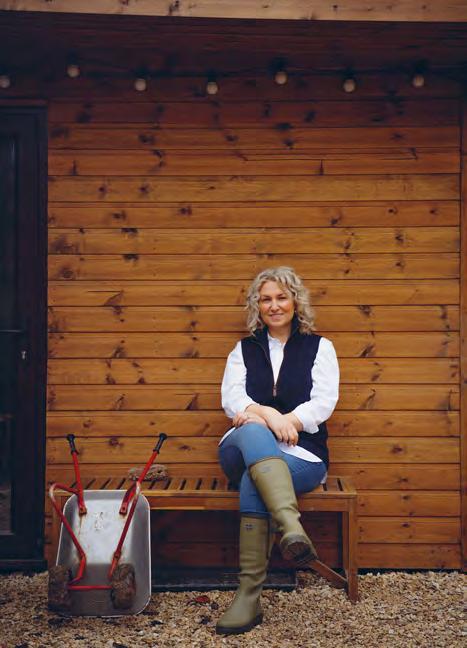
Esh Construction
www.tynebridge.org
www.eshgroup.co.uk/constructing-local LinkedIn: Esh Group
The restoration of the Grade II* listed Tyne Bridge is one of the most visible and eagerly awaited engineering projects in the North East, with many in the region keeping a watchful eye on its progress. Here, Kate Marshall, social value manager for contractor Esh Construction, tells N magazine how the company is building a legacy in the community and encouraging young people to consider a career in construction.
The Tyne Bridge is an icon of the North East, symbolising the social and economic connections between Newcastle, Gateshead and the wider region, both literally and figuratively.
Fitting, then, that the multi-million-pound project to restore the structure to its former glory has become an emblem of contractor Esh Construction’s long-standing commitment to building links with communities it serves.
Led by its dedicated social value team, Esh has spent more than ten years inspiring the next generation to consider careers in construction and engineering, while also volunteering time and expertise to local projects.
The Tyne Bridge restoration, which saw Esh appointed contractor in 2022 on behalf of Newcastle City Council and Gateshead Council, has built on existing partnerships with schools, colleges and universities, local government, charities and community organisations to offer a range of learning opportunities for young people and introduce younger children to STEM careers.

Kate Marshall, social value manager for the North East and Tees Valley, says: “Work is progressing well on the Tyne Bridge; we’ve hit a number of milestones in recent weeks and parts of the bridge will soon be visible to the public where blasting, repair works and repainting is completed.
“The social value projects we’re carrying out in connection with the Tyne Bridge restoration, and other contracts across the region, are part of our Constructing Local strategy, a framework built on six Es – employment, economy, education, engagement, employees and ‘even greener’.
“Esh has been delivering social value for ten years, but we have had education programmes in place since 2009, including our awardwinning Building My Skills programme, which has supported more than 60,000 students since its inception.”
Esh Construction’s social value team carries out almost daily school visits to educate and inspire young people about the jobs available in the construction industry.
A new partnership with the North East Combined Authority has boosted the number of schools receiving careers-linked lessons by training careers champions in schools to deliver Esh’s award-winning Get into STEM workshops, enabling the lesson kits to be rotated for wider reach.
The Tyne Bridge project has also offered 450 days of work experience to further and higher education students, including longer-term placements for Newcastle University civil engineering students and Newcastle College T-level students.
And since April last year, it has engaged with more than 2000 students from both Newcastle and Gateshead schools.
Kate says: “The partnership with the combined authority means we can reach so many more primary schools, inspiring children as young as four to consider a STEM career when they are older.
“We are working with schools in Byker to raise aspirations by taking hands-on activities into classrooms.
“We talk about things like bricklaying, but also about quantity surveying and planning roles.
“In secondary schools, we target curriculum subjects including maths and science with our Construction in the Curriculum workshops, to make them aware that what they do in the classroom has a purpose and an application in the real world.
“We want to start conversations with children and young people, and help them see what’s out there for them.”
The Tyne Bridge project has also strengthened relationships with charities around the region.
From workshops at the Discovery Museum to donations of time and funds to local veterans’ charities, Esh Construction has supported a cross-section of organisations close to the heart of the city.
A dedicated base, known as the Information Hub, has opened on the quayside to offer a place where local businesses, interested residents or even visitors to the city can find out more about the project.
Mindful the Tyne Bridge can also be a sensitive location, 94 members of staff working on the site have been trained in suicide prevention, while workshops by the Lighthouse Construction Industry Charity have been arranged to support and educate its workforce in mental health awareness.
With the Tyne Bridge restoration project having historical significance across the region, Esh worked in partnership with Radius and VR Care to develop a one-of-a-kind tour, which immerses viewers into the history of the iconic North East landmark through 360-degree footage and archive content from over the years.
The VR programme was officially launched in local care homes to help people with dementia evoke memories of their younger days in the city.

Kate adds: “We incorporated a British Sign Language interpreter into the VR video presentation, to ensure as broad a range of people as possible have access to the historical significance of the Tyne Bridge through our social value programmes.”
The work done by the social value team will have a lasting legacy, inspiring the next generation of construction workers and engineers.
Kate says: “Esh was founded as a family company, and it still has a family feel today.
“We know that when we go on site we are causing a level of disruption to those in the local area.
“At Esh, we have a slogan – construction is what we do, but constructing local is who we are.”
Esh Construction
For more information about Esh Construction’s Constructing Local strategy and the work of its social value team, visit the website at the top of this article.
“Of course, we try to minimise that as much as possible across our schemes, while maximising the social and economic value for the local area.
Northumbria University www.northumbria.ac.uk/giving
Wubbleyou
www.wubbleyou.co.uk
LinkedIn: Wubbleyou
Wubbleyou founder Mark Renney has joined forces with Northumbria University to launch a scholarship aimed at supporting the next generation of tech talent. Here, Mark tells N magazine about the venture, his desire to give back to his alma mater and the vital university support he has received to grow Wubbleyou.
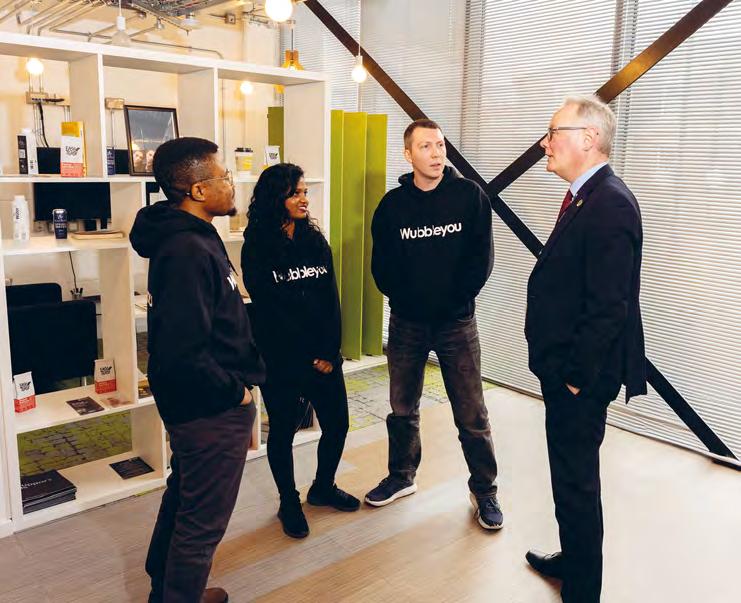
A tech firm founder has partnered with his former university to launch a scholarship aimed at nurturing the digital workers of tomorrow.
Mark Renney has joined forces with Northumbria University to create the Wubbleyou Postgraduate Scholarship.
The venture, which will start in September, covers artificial intelligence, computing and data science.
The student will also have the opportunity to work at North East-based Wubbleyou, which builds web and mobile platforms for public and private sector organisations nationwide.
The company was founded by Northumbria University computer science graduate Mark, who is keen to give back to his alma mater.
He says: “I was very fortunate to receive support from the Northumbria University Incubator scheme more than ten years ago.
“Setting up a business is difficult, especially as a young graduate, and the team at Northumbria offered me so much.
“You know that feeling when business feels like an uphill slog, when you’re finding it difficult to hire people and struggling to connect the dots?
“Well, I felt like that for years.
“But working with Northumbria University has made business growth much simpler.
“Want to test important – but not urgent –ideas? Want to bring in great people to scale, and have a partner which feels like they genuinely want to add value?
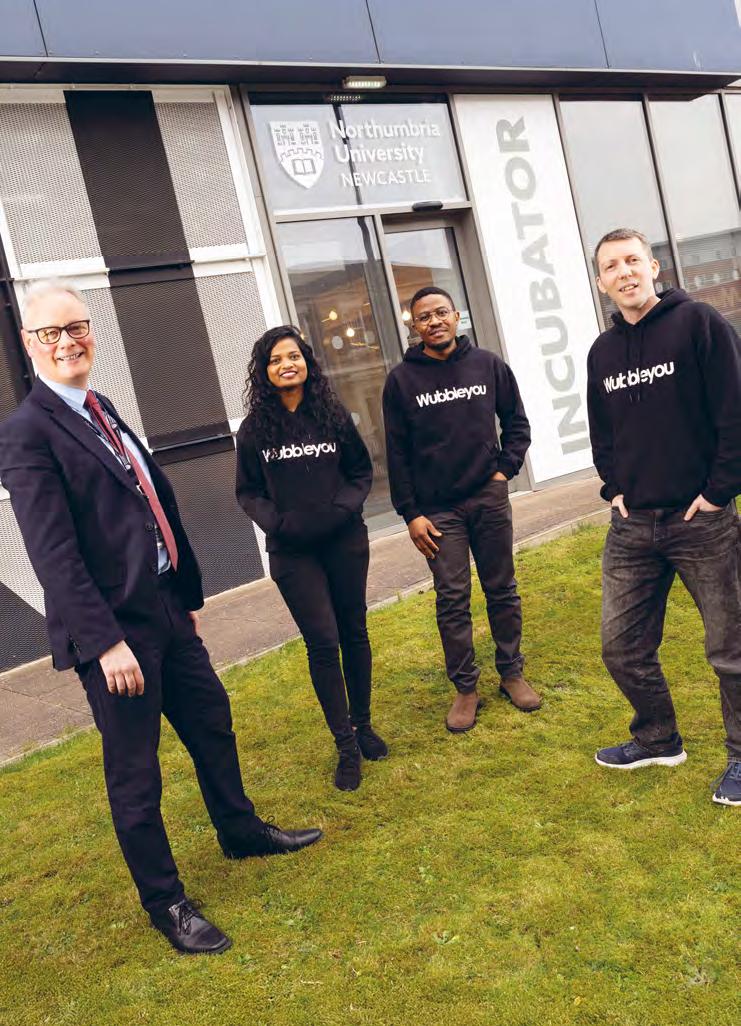
“That’s how Northumbria University has supported Wubbleyou.
“Our strong partnership has genuinely made business easier.”
Professor Graham Wynn, Northumbria University pro vice-chancellor for education, adds: “The Wubbleyou Postgraduate Scholarship continues the progress of the university’s successful Higher Education Without Barriers campaign.
“With support from alumni, businesses and charitable partners, Higher Education Without Barriers provides a range of financial initiatives, community-based projects and mental health and wellbeing services to make participation and progression in higher education more achievable for talented students, regardless of their circumstances.
“The support from key donors, including the Willan Charitable Trust, Santander Universities UK and the Jim Jackson Educational and Enabling Foundation, has been nothing less than remarkable, and is indicative of the determination of successful North East people to help the next generation.
“Since January 2022, donations to the Higher Education Without Barriers Fund have totalled almost £4 million.
“This money has supported more than 2500 students across the university community, including scholarships for students from under-represented groups.”
Pictured, from left to right, are Professor Graham Wynn, Northumbria University pro vice-chancellor for education; Divya Behera, Wubbleyou associate project manager; Vincent Onyeabor, Wubbleyou associate IT analyst; and Mark Renney, Wubbleyou founder
“Working with Northumbria University has made business growth much simpler”
Northumbria University
For more information about Northumbria University and the Wubbleyou Postgraduate Scholarship, visit the website at the top of this page.
To find out how your business can support the Higher Education Without Barriers campaign, contact james.wilkinson@northumbria. ac.uk
By Steven Hugill
You’re chair of the North East STEM Foundation. Can you tell us a little about the organisation and its key objectives?
The North East STEM Foundation was founded to open doors for young people across the region, enabling them to develop skills and build careers in science, technology, engineering and mathematics.
We are committed to bridging the gap between education and industry by partnering closely with businesses to deliver hands-on, real-world learning opportunities.
Our goal is to ensure every young person has the resources, support and inspiration to pursue fulfilling STEM careers that will drive innovation and economic growth in the North East.
The organisation is committed to creating opportunities for young people to flourish in STEM fields. How is it helping open those pathways, and what impact has it had to date?
The North East STEM Foundation takes a hands-on approach by funding and supporting initiatives that directly impact students, schools
As the world continues to shift towards a more sustainable future, the importance of a robust skills pipeline has never been greater. And playing a key role in strengthening the learning landscape is the North East STEM Foundation. Here, chair Tania Cooper tells Steven Hugill about the organisation’s objectives, its role in growing the green economy and the measures needed to further bolster the skills landscape.
and colleges.
Through exciting STEM outreach programmes, we inspire and encourage future generations to pursue careers in the sector.
We work to remove financial barriers, ensuring all children have access to quality STEM education.
We also continue to focus on creating more high-quality, STEM-focused learning environments across key stages three, four and five.
The North East STEM Foundation is supported by a number of businesses and organisations. How is their backing helping drive its mission forward?
Business support is crucial.
Our industry partners contribute funding, expertise and invaluable real-world insight that shape our initiatives.
Through working together with employers, we ensure young people are gaining the skills and knowledge that align with the current and future demands of the industry.
As the world transitions towards greater sustainability, the demand for a workforce equipped with STEM skills has never been more critical. What specific measures do you believe are needed to continue building that future-ready talent pipeline?
To build a workforce prepared for the green economy, we need a comprehensive, multifaceted approach.
Early STEM engagement is vital to inspire young people from primary school onwards with hands-on projects, role models and realworld applications.
Stronger links between education and industry are needed to ensure technical curriculums complement emerging technologies.
Increased investment is also needed for STEMfocused colleges, apprenticeships and training centres.
Finally, support for upskilling and reskilling is required to help workers transition into new roles and adapt to evolving industries.
By taking these steps, we can ensure the North East leads the way in sustainability-focused
industries while creating high-value job opportunities for the future.
The Tees Maritime Cluster aims to harness Teesside’s marine sector strengths to drive economic growth and net-zero improvements. What impact do you see it having, and how will the North East STEM Foundation contribute to its ambitions?
The Tees Maritime Cluster is a ground-breaking initiative that will position Teesside at the forefront of the UK’s green maritime transition.
By using the region’s established strengths in engineering, offshore energy and logistics, it has the potential to create thousands of high-quality jobs and attract significant investment.
The North East STEM Foundation is committed to supporting the efforts of Hightide and other charitable organisations that are already heavily invested in advancing this vital industry.
Similarly, the North East Regional Defence and Security Cluster is making strides to bolster the UK’s cyber defences. How is the North East STEM Foundation feeding into its blueprint?
Cybersecurity is one of the fastest-growing and most essential fields within STEM.
I’m pleased the North East is well positioned to become a leading hub for digital defence innovation.
The North East STEM Foundation is playing a key role by supporting cyber-focused educational programmes, cultivating strong industry partnerships and ensuring young people recognise cybersecurity as a viable and rewarding career path.
What are the key measures needed to further improve the skills landscape?
It’s a combination of factors:
• Greater funding for STEM education –Schools, colleges and training providers need better resources to deliver high-quality technical education
• Stronger Government support – Policies that encourage apprenticeships, industry-led training and investment in new facilities
• Enhanced collaboration between schools and businesses – More industry involvement in curriculum design, mentorship programmes and hands-on learning experiences
• Challenging outdated perceptions – STEM careers must be made more visible and accessible, especially for under-represented groups
By addressing these areas, we can create a thriving STEM talent pipeline that meets the long-term needs of the region and the country.
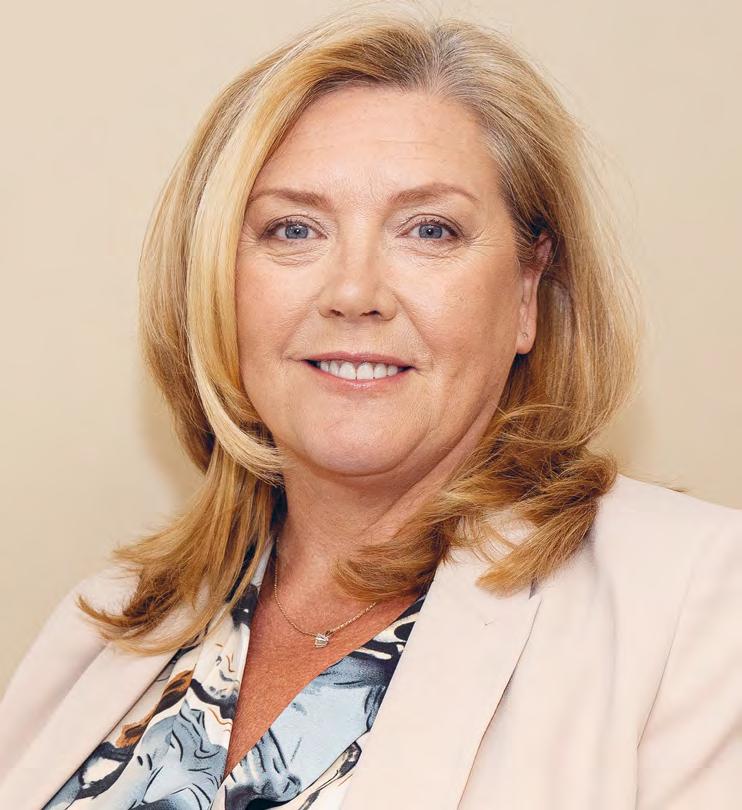




Away from your role as Entrepreneurs’ Forum chief executive, you are a keen triathlete. What sparked your passion for endurance sport?
I took up running after I had my children, as it was the only sport I could fit around work and family commitments.
I joined my local running club to meet other like-minded people, and it didn’t take long for a friend to persuade me to buy a bike and enter a local triathlon for fun.
At the time, I had no idea my triathlon journey would become such a big part of my life.
I entered my first ‘half Ironman’ in 2018 at Bamburgh, in Northumberland.
I remember panicking that I’d be eliminated after the swim for being too slow, but I ended up being the first female finisher. Since then, I’ve competed in many triathlons, including three Iron distance races, which involve a 2.4-mile swim, a 112-mile bike ride and a marathon.
Given the incredible physicality and multi-discipline demands of triathlon competition, you must have quite the training regime. How do you balance maintaining fitness with the day-to-day demands of your job?
Last year, I engaged the help of a triathlon coach, who sets my training programme and holds me accountable. He understands my life and has built a programme that can be flexed around any commitments I have as part of my Entrepreneurs’ Forum role.
I train between ten and 20 hours per week, which means I have seen a lot of sunrises.
Similarly, how do you overcome the mental challenges of competing in such a gruelling sport?
I know that if I’m at the start line, having given 100 per cent in training, then I’m prepared for the race.
This knowledge motivates me to stick to my training plan, as I don’t want to let myself down.
It also gives me the confidence on race day to push myself to my limits and never give up.
I love competing, so I definitely relish the challenge of endurance events.
You’ve competed around the world in triathlon events, and will head to Hawaii in October after qualifying for the Ironman World Championship. How much are you looking forward to that test?
I’m so excited.
Kona, the big island of Hawaii, is the spiritual home of triathlon and where Ironman was invented in 1978.
I’ll be competing in the 50-55 age group category against the very best women in the world.
It’s going to be a huge challenge, not only because the standard will be world-class, but also because I’ll be racing in humid conditions, in temperatures that could exceed 30 degrees, and with a 12-hour time difference too.
Where does participation in the famous island state event rank in your achievements? And do you have any future goals?
Qualifying for Kona is a big deal, but I haven’t raced it yet.
I have previously competed for Team GB age group in the European Championships at Olympic distances, where I finished seventh.
Wearing my GB kit was an amazing experience, but I feel Kona will top it.
I haven’t thought beyond this year, but the great thing about triathlon is that you compete against others in your age category, so there’s no reason why I can’t keep racing for many years to come.
Are there any crossovers between your job and pastime?
Do skills from one help influence the other?
I’ve had to get very good at time management.
If I wasn’t busy enough, I’m also a qualified triathlon coach, working primarily with juniors.
Whether I’m working with young athletes or entrepreneurs, my role is to keep them energised, motivated and inspired to do their best.
I also get to use my event organising skills to arrange local triathlons, including the Ponteland Sprint Triathlon on May 18 this year, which will have more than 100 competitors from across the North East.
Northstar Ventures www.northstarventures.co.uk
LinkedIn: Northstar Ventures UK
Northstar Ventures has helped spur hundreds of companies’ growth journeys and the creation of more than 2000 jobs across the last two decades. And the Northstar EIS Growth Fund is now providing investors with the opportunity to back innovative, high growth businesses with a focus on the climate technology and healthy ageing sectors. Here, Alasdair Greig, director at the firm, tells N magazine about the fund and how it fits into Northstar Ventures’ broader portfolio.
For more than 20 years, Northstar Ventures has invested in the best of the North East’s technology companies, from the highest potential university spin-outs to the most ambitious entrepreneur-led start-ups.
And its numbers are profound.
During those last two decades, the Newcastlebased firm has invested upwards of £130 million into more than 400 companies, helping to create in excess of 2000 jobs.
That support has been integral too in shining a spotlight on the evolution of the region’s commercial landscape from heavy industry to digital pioneers and clean energy and healthcare sector firsts.
Alasdair Greig, director at Northstar Ventures, says: “The region’s technology base has been a vital factor in the development of a cluster of high growth companies in the clean technology and healthy ageing sectors.
“Our five universities and growing number of key regional institutes, including the two National Innovation Centres for Ageing and Data, and the Offshore Renewable Energy (ORE) Catapult, have all helped establish new businesses in the area, and also act as a magnet for companies wishing to relocate.”
Having established its investment credentials over more than 20 years, the firm is leveraging its momentum through the Northstar EIS Growth Fund.
Launched last year, and focused on climate technology and healthy ageing themes, the tax-efficient fund gives investors a way to back innovative, scale-up businesses with high growth potential.
Alasdair says: “Until a year ago, it was very hard for individual investors to back the exciting high growth companies that we invest in.
“All that changed in 2024, though, when we launched the Northstar EIS Growth Fund.
“The fund gives investors the opportunity to invest in a diversified portfolio focused on the most promising opportunities in our portfolio.
“Investors in the 2024 tranche now have stakes in companies such as NunaBio, MySalesCoach, OnHand and Wordnerds.
“These companies span a varied range of technologies, from DNA synthesis to using artificial intelligence to provide business insights to retailers.
“What they all have in common is that they are rooted in our region and are using technology to tackle some of society’s biggest challenges.”
The Northstar EIS Growth Fund has several key features, which include:
• A conviction-led approach to investment that backs the transformative technologies of the future
• A focus on investee companies that have already demonstrated strong commercial traction and are primed for high growth
• A supportive approach that enhances operational performance and exit opportunities
Furthermore, the fund offers:
• Targeted returns of £2.50 for every £1 invested*
• Significant EIS tax reliefs, including 30 per cent income tax relief, capital gains tax-free growth and inheritance tax business relief*
*
The first tranche of the fund will soon be fully invested, with a second tranche now open for investment.
• Potential to utilise income tax reliefs in the 2024/2025 and 2025/2026 tax years, and hold over chargeable gains from the previous three years
• A diversified portfolio designed to reduce risk while enhancing tax free returns
A commitment to supporting companies and the teams it backs goes hand-in-hand with the cash that Northstar Ventures invests.
Alasdair says: “Strong management teams are an essential part of generating strong investment returns.
“This is all the more vital in early-stage businesses, which are often led by first-time founders.
“A successful venture capital fund is about more than just investing cash.
“Potential needs to be turned into tangible cash returns.
“In May last year, one of Northstar Ventures’ investee companies – Houghton-le-Springbased construction sector management software firm Clixifix – was bought by European software as a service operator Smartcraft ASA.
“The deal generated a cash return of nearly five times the sums invested by Northstar Ventures.
“It marked the first step for Smartcraft outside its core Nordic market, and Clixifix is now acting as a catalyst for its continued growth in the UK and Europe.
“Our investment in Clixifix exemplifies the way in which venture capital can catalyse the creation, and support the growth, of the businesses of the future.”
Northstar Ventures
For more information about Northstar Ventures and the Northstar EIS Growth Fund, visit the website at the top of this article. The next tranche of the Northstar EIS Growth Fund is expected to close at the end of April, and is intended to be invested during the 2025/2026 tax year. Northstar Ventures is authorised and regulated by the Financial Conduct Authority.


Strong relationships are the bedrock of any venture. Just ask 11Arches. Having formed an alliance with the North East Chamber of Commerce, the Bishop Auckland-based charity, known for presenting open-air history show Kynren, has cultivated new relationships that are providing fresh opportunities for collaboration, sponsorship and support. Here, Wendy Wilshere, Kynren head of volunteer casting and engagement, tells N magazine about the live show, the benefits of its North East Chamber of Commerce membership and why other operators should consider working with the business organisation.
Tell us a little about Kynren and its mission
Kynren is an award-winning live action outdoor show that takes audiences on an unforgettable journey through 2000 years of English history, myth and legend.
Performed on an epic scale, it features a cast and crew of 1000 volunteers, bringing history to life on a seven-and-a-half-acre stage –equivalent to five football pitches – with an 8000-seat tribune in Bishop Auckland, County Durham.
Kynren’s mission is to inspire and educate audiences while driving tourism to the region, encouraging overnight visits and supporting the local economy through jobs, training and skills development.
And we are now expanding with Kynren, through The Storied Lands, a new timetravelling theme park planned to open in summer 2026, which will feature epic shows and immersive experiences.
It will create significant new employment and training opportunities, further strengthening Kynren’s impact on the local community.
How did your membership with the North East Chamber of Commerce begin, and why did it feel like a natural fit for Kynren?
Kynren benefits from being part of the North East Chamber of Commerce’s extensive network, which connects us with businesses and organisations that share a common goal of driving economic growth and enhancing the region’s profile.
We approached the Chamber to explore
www.necc.co.uk
LinkedIn: North East Chamber of Commerce
www.11arches.com
Instagram: kynren
how we could be part of this network and collaborate with other members to build awareness of Kynren and its impact on the local area.
The Chamber’s focus on supporting the region aligns with our own ambitions to make Bishop Auckland a key cultural and visitor destination.
Engaging with other members helps us form valuable relationships that can lead to new opportunities for partnerships, sponsorship and support.
How has the membership benefited Kynren’s work? Has it helped raise awareness to a broader audience?
Through our Chamber membership, we’ve been able to connect with a wide range of businesses and organisations across the North East, helping us increase awareness of Kynren and its role in the region’s cultural and economic landscape.
The network has also allowed us to share insights into the opportunities available at Kynren, whether through volunteering, corporate engagement or event partnerships.
Over the past ten years, Kynren has established itself as a key visitor attraction, and being part of the Chamber has given us additional opportunities to showcase what we do to a wider audience.
Our presence on the Chamber’s website and participation in networking events has helped us foster relationships with businesses that might not otherwise have been aware of our work.

Kynren’s Wendy Wilshere is one of ten finalists in the VisitEngland Tourism Superstar 2025 awards, which celebrate the dedication and passion of the industry’s employees and volunteers, and is decided by public vote. Wendy is the only finalist from the North East after winning Durham Tourism Superstar in 2024. Cast your vote for her, ahead of the March 23 deadline, here: https://visitenglandawards.secureplatform.com/tourismsuperstar/ gallery?roundId=373



To what extent has the North East Chamber of Commerce’s extensive network helped Kynren increase visibility and forge new connections with potential donors, volunteers and supporters?
The Chamber’s networking events and business connections have been valuable in introducing us to like-minded organisations across the region.
Attending these events has allowed us to build relationships that support the growth and success of Kynren.
We are also looking forward to expanding our involvement by potentially hosting a future Chamber event at the Kynren site.
This will provide an opportunity to showcase what we do first-hand, and demonstrate how businesses can engage with us in a meaningful way.
With the development of Kynren – The Storied Lands on the horizon, these connections will be even more valuable in raising awareness and building excitement for the new attraction as we move toward the planned opening next summer.
How valuable is it that business organisations like the North East Chamber of Commerce support charities and community interest companies?
Being part of a strong and engaged business network is incredibly valuable for cultural attractions like Kynren.
The Chamber provides a platform for
businesses and organisations to connect, share ideas and support each other in driving regional success.
Kynren plays a significant role in bringing visitors to the area and contributing to the local economy, and it’s important that businesses and cultural organisations work together to maximise opportunities for growth and development.
The Chamber helps facilitate these connections, ensuring organisations like Kynren can reach new audiences and build strategic partnerships.
What advice would you offer to other organisations considering a membership with the North East Chamber of Commerce?
Being part of the Chamber opens doors to new opportunities and relationships.
We’d encourage other organisations to make the most of the networking events and forums available, as these provide valuable chances to meet like-minded businesses and explore potential collaborations.
Attending events, engaging with other members and being proactive in sharing your organisation’s story can help raise your profile and lead to unexpected opportunities.
Whether you’re looking to build brand awareness, form partnerships or simply be part of a wider conversation about the future of the region, Chamber membership is a great way to get involved.
“The Chamber’s focus on supporting the region aligns with our own ambitions to make Bishop Auckland a key cultural and visitor destination”
North East Chamber of Commerce
For more information about the work of the North East Chamber of Commerce and its membership opportunities, visit the website at the top of this article.
Kynren
To learn more about 11Arches and live-action show Kynren, visit the website and Instagram page at the top of this article.

Zara Paul is co-founder of Durham web-based artificial intelligence video editing platform Choppity. Here, they tell Steven Hugill about the venture’s founding, the dynamics of running a business alongside their partner and how a recent appearance on Dragons’ Den has provided great confidence for future endeavours.
www.choppity.com
You are the co-founder of web-based artificial intelligence video editing platform Choppity. What inspired you to found the business, and what services does it provide?
Traditional video editors are overly complex, while modern tools lack scalability.
Content creators, marketers and businesses still rely on software like Premiere Pro for even simple tasks – editing a 30-second TikTok with movie-grade tools is overkill.
Inspired by Canva and Figma’s impact on design, we built Choppity, an automated video editor that streamlines advertising, marketing, sales and training video creation.
Choppity edits videos for you, making professional-quality content fast and effortlessly.
You are married to your business partner Aaron Morris. How does your personal relationship affect your work dynamic? Are there moments when your roles overlap, and how do you navigate any conflict that may arise?
Our work dynamic shapes our relationship.
I mentioned on Dragons’ Den that we had set a rule during our anniversary dinner to not talk about work – and it was nearly impossible to follow.
We love what we do, and working together has strengthened our communication.
That said, there are tricky moments, like deciding whether to approach Aaron as a spouse or a chief executive.
If he’s been working for 20 hours straight and there’s an urgent email, do I bring it to him or let him sleep?
As you allude, you recently appeared on BBC show Dragons’ Den, wherein Peter Jones tabled a £100,000 investment offer. However,
as can happen with the programme, you subsequently chose not to pursue the financial proposal. What were the factors behind your decision, and what does it say about your long-term vision for the firm?
We were thrilled about the opportunity to work with Peter.
After the pitch, he shared our excitement, talking about introductions and office visits.
It felt like the beginning of something big –we even started imagining ourselves as his protégés.
But in the weeks after filming, we heard nothing.
Anxiety grew as our advisors highlighted the challenges of the proposed deal (15 per cent equity for £100,000, with an option to buy back 2.5 per cent for £100,000), which would have made future fundraising difficult.
When Peter’s investment manager finally reached out, we were still hopeful.
But it soon became clear his enthusiasm didn’t match that of Peter.
We would have been just another portfolio company, not the hands-on mentorship we had envisioned.
Communication faded on both sides, and eventually his manager assumed we no longer wanted to proceed.
We apologised for the lapse but acknowledged the deal no longer made sense for us.
It was disappointing; Peter would have been the perfect investor, if he had also invested his time and energy.
As we said on the show, we were after the people, not just the money.
Our vision remains unchanged: we want Choppity in every business, every marketer using it regularly and to transform how business videos are created.
In addition to Peter Jones, other Dragons – including County Durham’s Sara Davies –expressed significant interest in Choppity. Has the validation of such recognised entrepreneurs boosted your confidence, and has it influenced your strategy and decisionmaking?
The Dragons are ruthless, so to have received three offers was incredibly validating.
The best outcome of the show was that they recognised us as strong entrepreneurs, despite Touker Suleyman and Sara admitting to not fully understanding the industry that we’re in. It’s made us more determined than ever to succeed and prove their trust in us was right.
What are your future plans for Choppity? Are there any specific goals you’re keen to achieve over the coming years?
We want Choppity to be used by every business and creator for their social media and marketing videos.
Our goal is for Choppity to be synonymous with Canva in the video space.

Jacksons Law Firm
www.jacksons-law.com
LinkedIn: Jacksons Law Firm
Jacksons Law Firm, the awardwinning, independent legal sector operator, is gearing up to celebrate 150 years in business while evolving to ensure success over its next century-and-a-half.
Jacksons Law Firm recently made a number of key appointments and promotions, and has undergone a significant restructure, as it embraces modern and flexible working practices.
The firm recently announced a formidable female duo was taking the reins, as it replaced the traditional managing partner role with new head of legal Erica Turner and Amie Callan in the role of head of operations.
And Erica says “the best is yet to come” as the firm undertakes an exciting brand project and demonstrates it “is not afraid to do things differently” to achieve ambitious aims.
She says: “While we are currently working on a hugely exciting brand project, the high quality of legal services, which we have provided for 150 years, remains.”
This commitment to quality saw the firm take home the law firm of the year and practice management awards at the Northern Law Awards in 2024 – titles it is keen to build upon.
The practice management award was welcome recognition of Jacksons’ promotion of nonlawyers to senior positions, a commitment
reflected through partner Amie’s background in accountancy.
In addition, Beckie Talbot has advanced to the position of accounts manager with the firm, having started out as a legal cashier.
Erica says: “Jacksons has an impressive legacy, outstanding people in key positions and has enjoyed a number of recent successes.
“But, like any business in any industry, we need to move with the times in terms of the way we serve clients and look after employees.
“We are committed to retaining Jacksons’ independence and ensuring our team can provide high quality legal services in the best environment we can create, for many decades to come.”
The firm has also introduced modern working practices, such as term-time working, providing a move towards flexibility for employees rarely seen in legal services.
Erica says: “We have demonstrated there are opportunities to progress in your career at Jacksons, whether you have a legal background or not, and we will continue to offer flexible
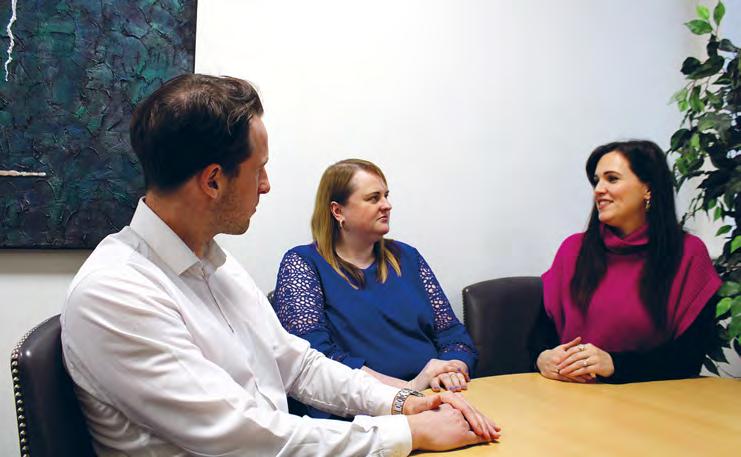

working practices to ensure we get the best people supporting us to become the greatest independent law firm in the North East.”
Recently, Philippa Walker was appointed in a term-time only associate solicitor role.
The position had a large influx of applications from males and females, showing there is increasing demand from a diverse range of people to progress their careers around other commitments – something Jacksons is keen to support.
Philippa says: “I was very surprised to find out about this rare opportunity, as it wasn’t something I’d heard of before.
“I’m a mum of two young children, and the new role is allowing me the opportunity to find the perfect balance and excel in my career while also being a parent.
“Jacksons have really embraced the idea of term-time working and are supporting me in this role.”
At the same time as providing a modern approach to work, Jacksons has cemented its commitment to independence by appointing professionals in the areas of compliance, marketing, IT and HR, bringing these services in house.
The firm’s newest recruit Dan Flounders is also set to take the firm’s corporate and commercial department to new heights, being involved in strategic decisions and seeing an opportunity at Jacksons that is better than anything else he has
identified in the region.
Dan says: “If I was ever going to leave to go anywhere, it was going to be to come to Jacksons.”
This demonstrates Jacksons is determined to become the legal employer of choice across the region, attracting dynamic people who have the ambition to be more than just a number and to have autonomy in the way they operate.
This is the strength an independent firm can bring to its employees and clients alike.

“We have demonstrated there are opportunities to progress in your career at Jacksons, whether you have a legal background or not”
Jacksons Law Firm
For more information about Jacksons Law Firm, the services it provides and its working practices, visit the website at the top of this article.
Perspective Financial Group
www.pfgl.co.uk
@perspectivefgl
October’s Budget marked a significant shift in economic policy, not least around inheritance tax. Here, Ian Wilkinson, managing director at Chartered financial advisor Perspective (North East), highlights the strategies you can take to legally reduce your inheritance tax liability and ensure more of your estate benefits your family.
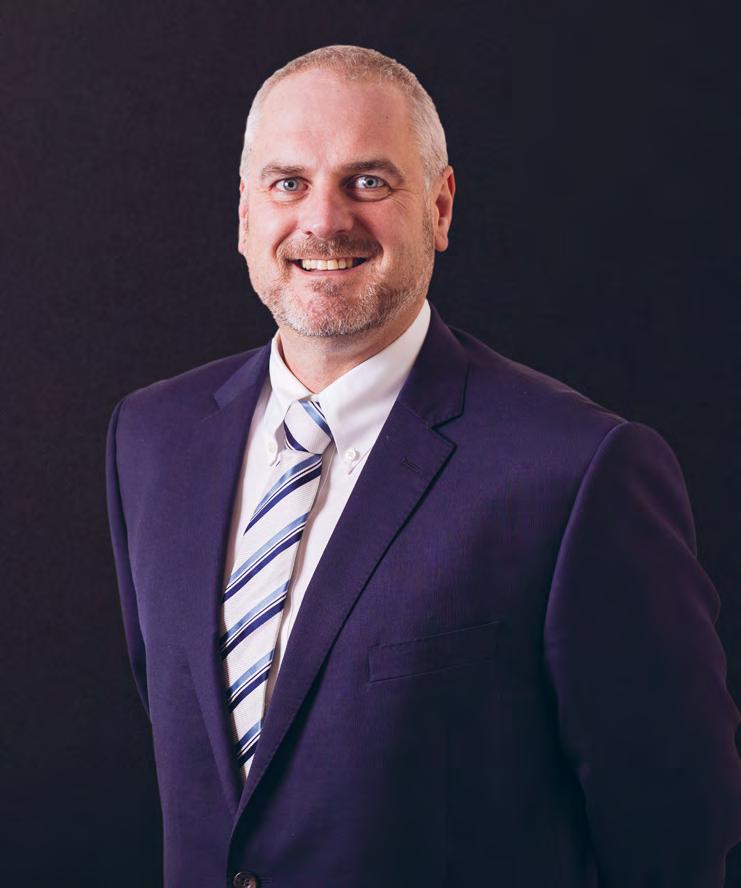
As the UK’s financial environment evolves under new Westminster leadership, refreshing your personal economic outlook has never been more important.
With headline reforms, including changes to inheritance tax, comes the need for greater understanding and an awareness of the steps you can take to mitigate their impact.
Helping provide such is Chartered financial advisory firm Perspective (North East).
Thanks to the tailored guidance of its expert teams, it stands ready to help you map out a financial future that protects your wealth today while securing your family’s tomorrow.
Here, managing director Ian Wilkinson highlights some of the steps you can take around inheritance tax.
Use the nil-rate band and residence nil-rate band
The nil-rate band allows the first £325,000 of your estate to be passed on tax-free.
If your estate exceeds this threshold, inheritance tax is charged at 40 per cent.
The residence nil-rate band, currently £175,000, applies if you pass your main home to direct descendants.
Married couples and civil partners can combine their allowances, potentially shielding up to £1 million from inheritance tax.
Gifting money during your lifetime is a great way to reduce your taxable estate.
Regular gifts out of income, such as funding a
grandchild’s education, can also qualify if they do not affect your standard of living.
Unused allowances can be carried forward for one year.
However, it is crucial you keep accurate records of the gifts you make so you, or your heirs, can evidence them if required in the future.
If you gift assets and survive for seven years, the gift falls outside your estate for inheritance tax purposes.
If you pass away within this period, the gift may be taxed on a sliding scale known as ‘taper relief’, reducing the tax burden depending on how many years you live after making the gift.
Setting up a trust can help manage your estate efficiently and reduce inheritance tax liability.
Trusts allow you to pass on assets without them forming part of your estate for tax purposes.
Potential options include:
Bare trusts – Here, assets belong to beneficiaries but are managed by trustees
Discretionary trusts – In this scenario, trustees control distributions, which can be useful for complex family arrangements
Interest in possession trusts – Here, beneficiaries receive income while assets remain protected
Leave money to charity
Donations to registered charities are exempt from inheritance tax.
Additionally, if you leave at least ten per cent of your estate to charity, your inheritance tax rate on the remaining taxable estate reduces from 40 per cent to 36 per cent.
“With headline reforms, including changes to inheritance tax, comes the need for greater understanding and an awareness of the steps you can take to mitigate their impact”
Life insurance is an often overlooked option.
But a life insurance policy placed in trust can help cover inheritance tax liabilities without increasing the taxable estate.
These policies are designed to ensure your heirs have the liquidity to pay taxes when they fall without selling key assets, giving them the full benefit of your estate.
Placing life insurance policies in trust is essential, for it ensures the payout is not included in the taxable estate, allowing funds to go directly to beneficiaries without additional tax liabilities.
Trust arrangements also simplify access to funds, ensuring timely payouts to cover inheritance tax.
Certain investments qualify for business relief, allowing them to be passed on free of inheritance tax if held for at least two years.
These include shares in qualifying businesses and some AIM-listed stocks.
Your next steps
Minimising inheritance tax requires careful planning.
By taking proactive steps now, you can ensure more of your wealth stays with your family and beneficiaries.
Combining these strategies can have a material impact on a potential inheritance tax liability.
And we are here to help.
Our expert teams across our national office portfolio – which includes bases in Newcastle, Darlington, Stockton, Hexham and Harrogate, North Yorkshire – will support you every step of the way, providing advice and guidance tailored to your personal circumstances.
Perspective Financial Group
Operating from more than 50 bases across the UK, which include Perspective (North East) sites in Newcastle, Darlington, Stockton, Hexham and Harrogate, North Yorkshire, Perspective Financial Group’s local offices provide financial planning advice with client relationships that endure, on average, for more than 26 years and often span four generations of a family.
To find out more about its services, how it could support your needs in the post-Budget landscape and for office contact information, visit the website at the top of this article.
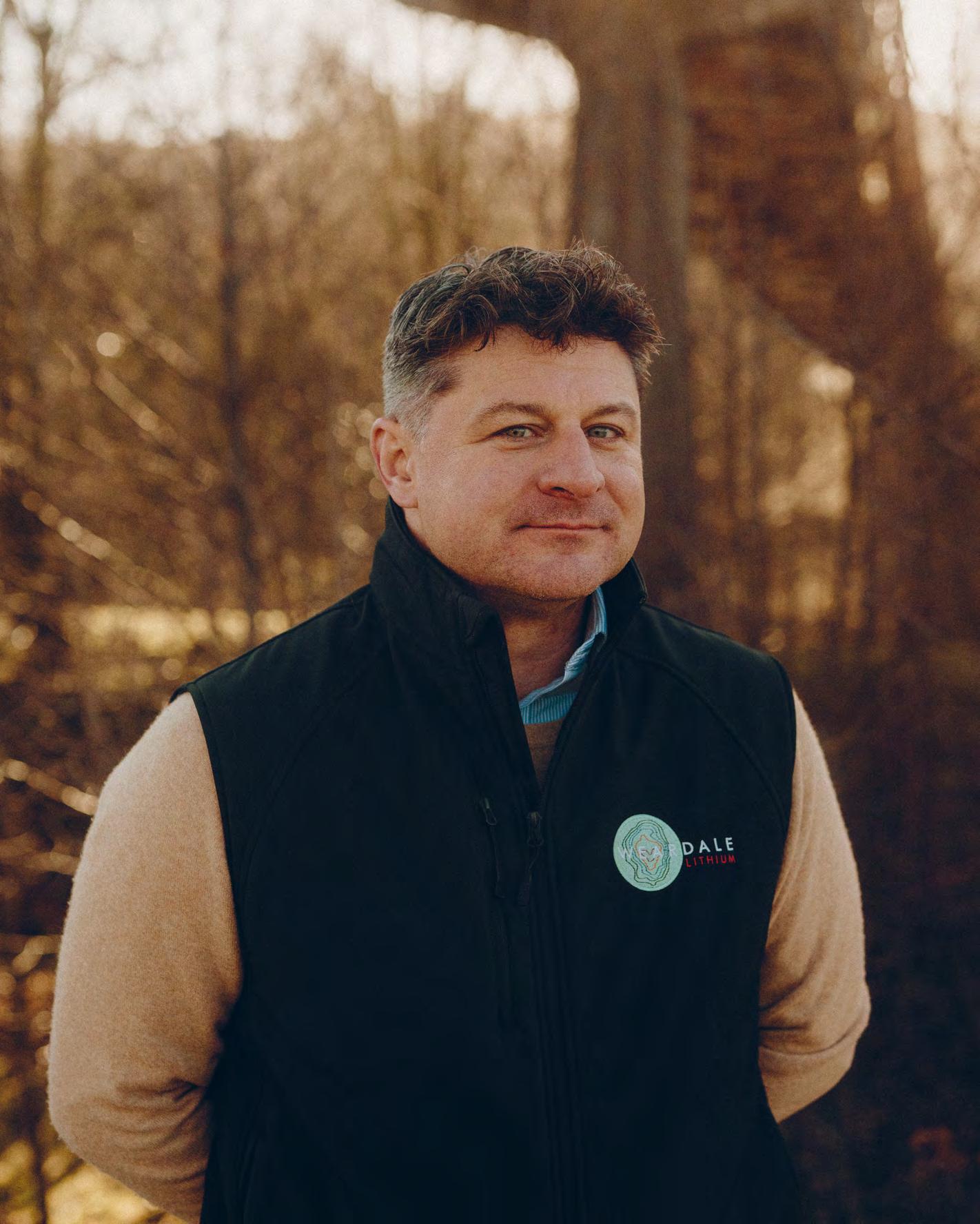
Words by Colin Young
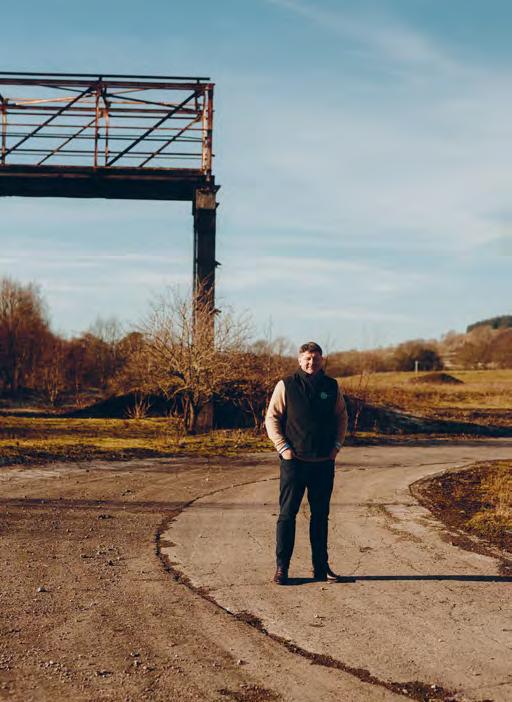
Weardale Lithium recently secured approval to build the country’s largest lithium extraction plant on the site of a disused County Durham cement works. The factory in Eastgate, near Stanhope, will eventually produce at least 10,000 tonnes of lithium carbonate every year, which will help accelerate production of electric vehicle power packs and battery energy storage systems. As well as adding £1 billion to the North East’s economy, the firm says the venture will create 125 jobs and put the region at the forefront of innovative uses for earthly resources. It has taken chief executive Stewart Dickson four years to get to this stage and, as he takes Colin Young on a voyage of discovery around its site, he explains why it will be worth the wait.
“And this,” says Stewart Dickson, “is what it’s all about…”
We get out of his car and approach a crash barrier at the edge of a precipice.
Before us, a breathtaking view of Weardale and the North Pennines hills stretches for miles.
Eastgate sits to the left, with Westgate to the right.
Below, just behind the River Wear, smothered by giant trees on either side, lies a derelict cement works and all its forlorn trimmings.
The ex-Blue Circle site closed in 2002, with the loss of 200 jobs, and its quarry, behind us, was used to film the television series Beowulf.
Stewart has been visiting this area for four years now and, as well as falling in love with the place, its beautiful surroundings and its people, he has become quite the expert.
He says: “The names Eastgate and Westgate date back to the gate entrances to the Durham Prince Bishops’ private hunting estate.”
We are, it has to be said, extremely fortunate with the weather and today’s view.
If there is another subject Stewart has become an expert on, it’s that Weardale has its own sub-climate.
Stewart has stood here before and struggled to see the crash barrier from a few feet away.
He is now always well-layered and prepared for anything.
Even, though, on a clear day like this, from the fields above, it is still impossible to grasp the scale of the operation ahead and the change it will bring at ground level.
It is so well hidden and unobtrusive, and Stewart plans to keep it that way.
He says: “The first time I came here, I actually drove over from the other side, through the Raby Estate, and I had to keep stopping, it was so arresting on the eyes.
“It was like a visual assault.
“It’s a privilege to operate here, but that comes with responsibility.
“It’s our responsibility to ensure it stays like this.
“And it will, because it’s a very low visual impact,
low footprint operation, which is why we’re using boreholes and pipes which are hidden, so the scenery remains the same.
“I’ve got children, and I want them and their generation to be able to see this landscape and other landscapes like this.
“It’s a non-negotiable part of this project.”
At ground level, Weardale Lithium headquarters is a 28-acre wasteland which, it turns out, has been very wasted for too long.
Hidden from the A689, it is nothing more than a huge, flat, weed-strewn expanse of concrete.
A derelict farmhouse stands in the distance.
A bridge and gantry cross the River Wear – still standing and an instant attraction to Stewart and his team, and an integral part of their plans.
Existing boreholes sink into nearby fields.
It will be transformed into a continuous flow, lithium extraction demonstration plant, which will operate an end-to-end, integrated direct lithium extraction (DLE) and carbonisation process.
Stewart says it is the only one of its kind currently approved in this country, and is expected to produce battery grade lithium carbonate on-site.
The company has already awarded the contract to provide technology licensing and proprietary engineering design to multinational firm KBR, which has been involved in the extensive testing of different DLE technologies, undertaken by Weardale Lithium, to find the optimal way to extract lithium from the geothermal groundwaters beneath the North Pennine Orefield.
The first phase of the project, to process lithium brine mineral resources, will start here, creating 20 to 30 jobs, before an expansion to a fullscale production plant.
Stewart says: “This site has all the ingredients we need; power, water and an A-road, and it’s a coincidence to some degree that the cement works was here because of the processed limestone quarry up there.
“You’ve got a unique geological environment here with the granite.
“There are only two places in the country –here and Cornwall – that host lithium enriched geothermal groundwaters.
“So, it’s a very unique area, and it’s a unique place.
“It’s a special place too, because you’ve got the
industrial heritage, which is going to create a foundation for our future green economy.
“There are a lot of very smart people in our team, and the companies we’re working with have done the preliminary detailed engineering for us.
“I’ve seen some of the work they do, and they’re the best in the business.
“We really have brought some of the top engineering names into this project, and a lot of the latest technology too.
“We live in an age where everything we do is digital or electrical, and increasingly so, so electric vehicles, battery energy storage systems in our homes and in the infrastructure of the country all require significant amounts of lithium.
“By 2030, it’s estimated we’ll need somewhere in the region of 80,000 tons of lithium carbonate per year – we currently produce none, and we’re 100 per cent reliant on imports.
“This is a mineral which is highly geopolitically charged, and China controls most of the production and refining.
“If we are to develop a resilient, secure, environmentally sensitive supply of lithium, this is a significant milestone for the UK’s electrification ambitions.”
He goes back to that first visit.


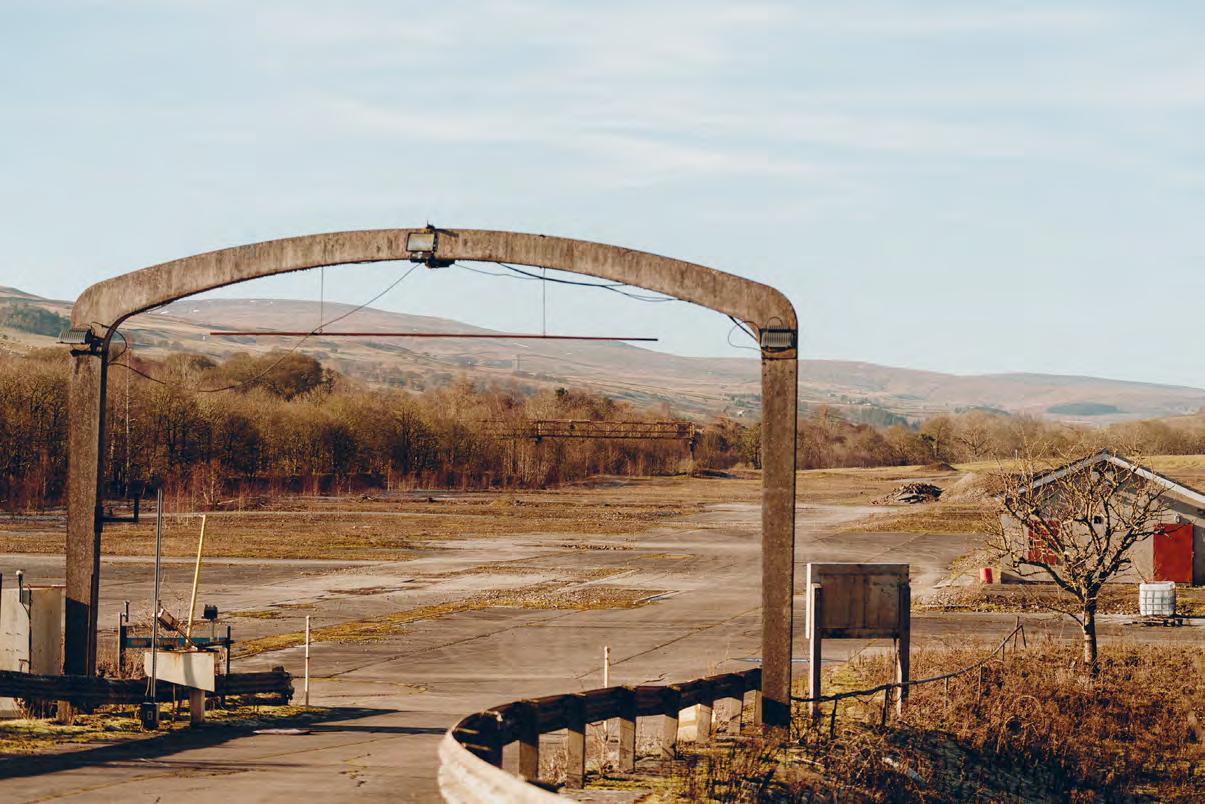

“I think, almost on day one, we dared to dream,” says Stewart.
He adds: “And in my head, standing here, you’re starting to envisage things - ‘well, we could put that over there, and that other here’.
“It came to life.
“But there was a lot of work to do; work on the boreholes, work on understanding the chemistry of the water, work on understanding the technologies required to extract the lithium from the water.
“We’ve had to put in a very detailed planning application for this site, which has been some two years in the making, and taken significant investment.
“It’s been a multi-million-pound investment to just get to the start line.”
We’re meeting the day after the company reached that starting line.
Stewart was present at Durham County Council headquarters for the key meeting in which councillors gave their backing to the project, after some amendments during the application phase.
The project’s duration is for 15 years for the pilot plant, but the pipelines will be permanent.
It was only a short wait before the unanimous verdict, but Stewart admitted feeling like an expectant father as he sat in the council’s chambers.
He says: “I’ve invested a lot of money, time and effort, and I care deeply about this project.
“I’ve spent four years on it, and intend to spend many more on it too.
“So, it is kind of my baby and it was a big day.
“I was asked lots of thoughtful questions, and we were very pleased to get every single committee vote.
“And then it was like, ‘this is our decision, get yourself away, get on with it’.
“With any planning application, there are a number of conditions, and we need to liaise with the council and satisfy them, which is normal.
“Then we have a few agreements to enter into with the council about how we fulfil the planning, which, again, is all perfectly normal for a large industrial project like this.
“That will take a little bit of time, and then we’ve got to start our phased execution.
“I’m hopeful we’ll be breaking ground sometime later this year.”
A former captain with the Yorkshire Regiment, Stewart has spent nearly two decades in the industry, working across the globe.
And although the family home is in Shropshire, he knows he will be spending even more time in this, now, his second home.
He says: “I’m a newcomer to the North East, and it wasn’t a place I knew well, but I had some understanding from my time in the army in Yorkshire.
“I have a great affinity with the focus and attitude of the region, and I like the unique characteristics people have in the North East.
“There is a hardworking, straight talking, get stuff done mentality, and I think that resonates deeply with the primary industries which we’re involved in now.
“It is great that this is a project the community wants.
“We’ve spent a long time talking to them.
“Industry is in their DNA, and we really wanted to make sure they knew what was going on and that they had their say.
“And we will continue to be transparent.”
Closing this edition of N magazine, Steven Petrie, managing partner at law firm Ward Hadaway, reflects on the company’s recent record results – which saw annual revenue rise seven per cent to £48 million – emphasises the importance of its flagship Newcastle office to future operations and lays out goals for the remainder of his term.
www.wardhadaway.com
LinkedIn: Ward Hadaway
Congratulations on the record annual financial results. What do they say about Ward Hadaway and its service delivery?
Client service has always been at the core of everything we do. Our commitment to providing first-class legal services is what truly sets us apart.
These results reflect that commitment, and the hard work and dedication of our people.
We are proud to have built long-lasting relationships with our clients, and these results are a direct outcome of our relentless focus on meeting their needs and delivering exceptional value.
The firm’s financial successes were driven by its offices in Leeds, Manchester and Newcastle’s Quayside. How important a role will the latter of those three play in achieving future growth objectives?
Each of our offices plays an integral role in our growth, with each being at a different stage of its journey.
Our Newcastle office, established in 1988, remains the largest of the three offices, and has laid a strong foundation for our expansion.
It will continue to play a pivotal role in our future growth.
The North East legal market is growing in national prominence, and we are proud to be a driving force behind that.
Our Leeds and Manchester offices are also critical to our plans. Although they are smaller in size compared to Newcastle, they are located in larger legal markets, and both continue to grow strongly.
Their position within these markets means they are perfectly placed to continue driving double-digit growth year-on-year, and we expect both offices to contribute significantly to our ongoing success.
You celebrate your first anniversary as managing partner on April 1. How do you look back on the last 12 months, and what are your goals for the rest of your term?
It has been a year of significant change and progress.
We’ve successfully restructured our departments to make them more manageable, rolled out and embedded our value and behavioural framework across the firm, and our new vision and strategy are in place with clear targets: £75 million by 2029 and £100 million by 2034.
We’re currently ahead of target, which is testament to the hard work and commitment of the entire team.
We’ve also made substantial investments in our Newcastle office, with ongoing refurbishment work to enhance the space for our people.
Nick Gholkar took on the role of executive partner in the Newcastle office last year, and we welcomed our new financial director in January.
From an emerging talent perspective, 15 trainees joined us across the firm in 2024.
Our headcount is now 521 and growing, and we’re also bringing in new partners in 2025, which will further our plans for significant growth.
Looking ahead, my goal is to continue driving the firm’s strategy, building on the progress we’ve made and ensuring that we are on track to meet our ambitious growth targets.
It’s been an exciting first year, and I’m looking forward to what’s ahead *.
